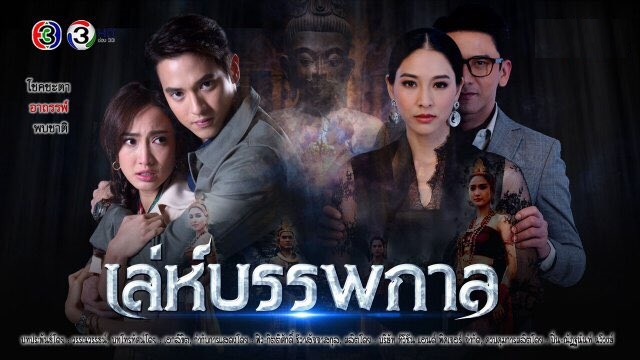
Who would have thought that a thousand-year-old trick can wreak so much havoc?
Hello everyone! I suppose many of you are quarantined at home – I know I am. Hope that this summary/review finds you well. It’s been a roller coaster ride, though I am not sure if watching it during these chaotic times made it more apt or just made things (more) stressful, but all I can say is that overall, I found this lakorn to be a masterpiece. Whether I like it or not, that’s another point, which I will discuss later on in this review.
But first, let’s go back to where we ended last time, shall we? Our heroes are intent on solving a mystery that is related to tumultuous events happening in the modern times. In doing so, they unexpectedly get a glimpse of their past lives, back in the era of Rama V (1890’s), where three points were uncovered.
First, a statue called the Gala Dewa Idol has been coveted by evil people since centuries ago, for the said statue holds the power of time. Second, Khun Uthaiyothin, Plerngfah’s past incarnation, sealed the power of the idol by using nine individuals who were born on auspicious times, hoping that should the idol fall onto evil hands, the Gala Dewa’s power will not be harnessed. Third, these nine people thus have to die in the same lifetime in order to unseal the idol and thereby use it to control time.
The remaining episodes thus focus on our heroes’ quest to 1) find out who the nine individuals who were used as seals are, 2) stop them from getting killed and 3) find out where the idol is and secure it from the villain. As far as the nine individuals are concerned – this plot element maintains the mysterious feel of the lakorn. Whenever the heroes are one step ahead, they fall two steps back as the two sides try to outsmart the other. Another innovation created by this plot element is that the viewers are made to guess who is Number 4,5,6, and so on are, and when and how will they be killed. I give props to the screenplay writer and casting director of the lakorn as this tricky element toyed with my emotions, really. What they did was that they introduced characters who play some role in the plot development and the viewer starts to weigh them in – are they significant enough to be one of the 9? I get drawn to them somewhat, only to realize that – oh shoot, they’re gonna die.
Of course, the significant individuals among the nine seals were numbers 8 and 9, but let’s go to that later. First, let’s get another plot element out of the way: finding the Gala Dewa Idol in the first place. Another mystery that took up some air time in the lakorn was figuring out where Mae Duangkhae kept the Gala Dewa Idol, and how the villains tried to use every means possible to get the genuine deal. This plot point was stretched for several minutes in several episodes, but here’s the quick summary for you guys: Mae Duangkhae acquired the idol after Uthai’s death (after Col. Kowalski apprehended Phee Boon in the forest as he tried to escape with it.) Duangkhae then used all of her resources, and all of her knowledge to hide the idol. She did so by first causing the fabrication of a fake idol which contained half of the map to where the real idol is hidden. The other half is hidden in Uthai’s painting, which was left in his house – the same house which was inherited by Phor Wong, and thereby was inherited by P’Krat’s dad, General Kit Itthiwongsa. Next, Duangkhae asked Mae Ging and Col Kowalski a favor to safekeep the fake idol. Mae Ging places the fake idol in the bank safe with instructions that only Sikhanol’s descendants may claim it in the future (in the person of Plerngfah). Duangkhae is reborn as Sitang, who, incidentally teaches in the same university where the real idol is hidden all along so she is able to decipher Duangkhae’s map.
After some major and minor road bumps along the way, Plernghfah and Sitang are able to locate the Gala Dewa Idol but through some snooping, Pakboon gets wind of their plan and plots to get to the idol in the same time as they do. Ultimately, it ends with Plerng and Pakboon touching the idol at the same time, only to be transported back to the past – like, 1,000 years ago past – where they see the creation story of the Gala Dewa Idol, among other things of course.

As we all know, linear plot progression is impossible in lakorns. There has to be a flashback every so often…even more so in reincarnation plots.
The Dvaravati Period (6th – 11th Century) where the first lifetime featured in the lakorn is set, was presented as a time of lore where mages and spirits roamed the land, and the men surprisingly had dreadlocks. BUT ANYWAY, we see a glimpse of the Kingdom of Waisalee which is ruled by a powerful mage, Thao Val. We first saw him through a vision when Uthaiyothin fought with Phee Boon in the forest back in the Rama V period, but we finally understand his origins when we see him first hand.

He cleans up pretty nicely, don’t you think? Thao Val is majestic, unlike the boring Dr. Adul and the nasty Phee Boon.
Waisalee was under the control of a bigger Kingdom called Aruna, and to be subjugated by them was just too much for Thao Val’s ego to bear. He thus forged a powerful tool – the Gala Dewa Idol – using nine different metals and fortified it by using the prayers of a hundred powerful mages – but even that does not make it complete. Ultimately, the idol needs the sacrifice of the souls of two powerful mages who have learned the art of Achanajak or opening the third eye to see their past. For this purpose, Thao Val adopted several orphans and trained each one of them to be mages in order to produce the worthy sacrifice for the completion of the Gala Dewa Idol.
Among the nameless orphans he adopted were Rawi and Thinnasaree, who – you guessed it, are the earlier incarnations of Plernghfah and Pakboon, respectively.
Though Rawi and Thinnasaree were able to learn the art of Achanajak, they had no idea that Thao Val plotted to sacrifice them to the idol. The thing is, these two must sacrifice their lives willingly and be trapped in the idol by their own accord – imagine that, a mystical object that respects free will! Thao Val thus plots this grand convoluted plan to have his two wards do just that. Thao Val is not only a learned wizard, but he’s a sick schemer too, so he took advantage of his wards’ strengths and weaknesses and made them go against each other, using the idol as their battleground. Thinnasaree was pure of heart, so pure that deception tarnished her will completely, way beyond repair. Rawi on the other hand was so honorable that he can sacrifice his life without any hesitation in order to save others.
It was a simple trick really, so simple that it makes you think: Gurl, seriously? You turned evil for a thousand years just for that? But actually, despite it being a cliché trick in the lakorn bag of tricks, the way it was presented in this lakorn made it quite gut wrenching to be worth the rage of a hundred lifetimes. Again, here’s the lowdown, Thinnasaree is head over heels in love with Rawi, since they basically grew up together, saw thick and thin together, and were even married in their past lives, as revealed by their third eyes. But Rawi friendzoned her early on, giving her the “I love you, but only as my sister” spiel. To add insult to injury, Rawi ventures out into the Kingdom of Aruna, meets Sasina (Sitang’s incarnation) and falls in love – since they are “soulmates”. (In reality, he and Sasina had been husband and wife in the other lifetimes, and Thinnasaree just got lucky in that one lifetime as Sasina was born as a Tiger then. Huh! Go figure!) What’s left for a friendzoned girl to do? She confesses her love to Rawi, and threatens him that if he doesn’t show up in her bedroom that night then she’ll think he doesn’t care about her and she will not care about herself anymore either. Cue in evil Thao Val – who had been eavesdropping at the two, and took this chance to disguise as Rawi; he tells Thinnasaree (as fake Rawi) that he loves her and then makes love with her. This happens not once, but twice, but each time, come morning, the real Rawi is back to giving Thinnasaree a cold shoulder. Not content with toying with Thinnasaree’s tender feelings, Thao Val makes it appear that Rawi is an ingrate who seeks greener pastures with Sasina, when in truth, Rawi only saw the scheme that Thao Val is brewing – that he wants to use Rawi and Thinnasaree in his plans to expand his power at the expense of making the people of Waisalee suffer. Rawi does not want to be an instrument to this evil plan and thus leaves for Aruna for good.
While he is away, Thinnasaree realizes that she is carrying (fake) Rawi’s child – and Thao Val causes her to miscarry, all this time, fooling Thinnasaree into thinking that Rawi must be blamed for all the misery that he had given her in exchange for her pure and undying affection. This thus kills Thinnasaree’s heart and instead fills her with a rage so deep that she decides to sacrifice herself (in the most brutal manner – like so brutal, I wonder how the censors allowed it to be on prime time tv) to cast a curse upon Aruna. This curse is so strong that it was bound to send plagues and other mishaps to keep the land lifeless for 7 generations. The grand finale of the curse is having Thinnasaree burned and sacrificed to the idol. Rawi gets wind of this and realizes that the only way to counteract the curse is for him to go and burn himself before the idol as well, to seal Thinnasaree, together with her curse, in the idol. Voila – Thao Val’s plan is complete.
Bad guys never win, so this period ends through a period. *Badumching*! Apparently, menstrual blood is the best spell neutralizer in those times, so Rawi, prior to burning himself alive, hands over a dagger coated with menstrual blood to Sasina, tells her to stab Thao Val with it in order to neutralize his invulnerability spell. Don’t ask me where Rawi got the menstrual blood as it was never explained (and don’t ask me whether menstrual blood is really all that powerful. Hmm… maybe it’s from the curse of billions of women across all generations. Even ghosts are scared of that I guess.) But in any event, Sasina succeeds, but likewise gets stabbed by Thao Val. In her dying breath, Sasina places the engraving on the Gala Dewa Idol’s foot where she swears to be Rawi’s lover in every lifetime, for as long as she is allowed to be reincarnated to be by his side again (this is a scene we saw in an earlier episode, as mentioned in my earlier review).
Just to recap, Rawi’s soul, and in theory, Thinnasaree’s also, get trapped in the Gala Dewa Idol for hundreds of years, until the idol is discovered in a cave, and droplets of Uthaiyothin’s father’s blood falls on it, thus releasing Rawi’s soul and allowing him to be reborn as Uthaiyothin.
Anyway, back to the plot. Mere milliseconds passed in the modern times during Plerng and Pakboon’s flashback and Plerng and Sitang manage to survive the shootout that ensues. The Gala Dewa Idol is placed in the police’s custody while things get messy when Dr. Adul tells the police that the mastermind of all the bombings and the killings is his wife, Pakboon. Things get even messier when Pakboon’s adoptive father, Kit Itthiwongsa, is further implicated in Pakboon’s schemes and gets caught attempting to kill several civilians for the sake of killing one of the 9 seals of the Gala Dewa Idol.
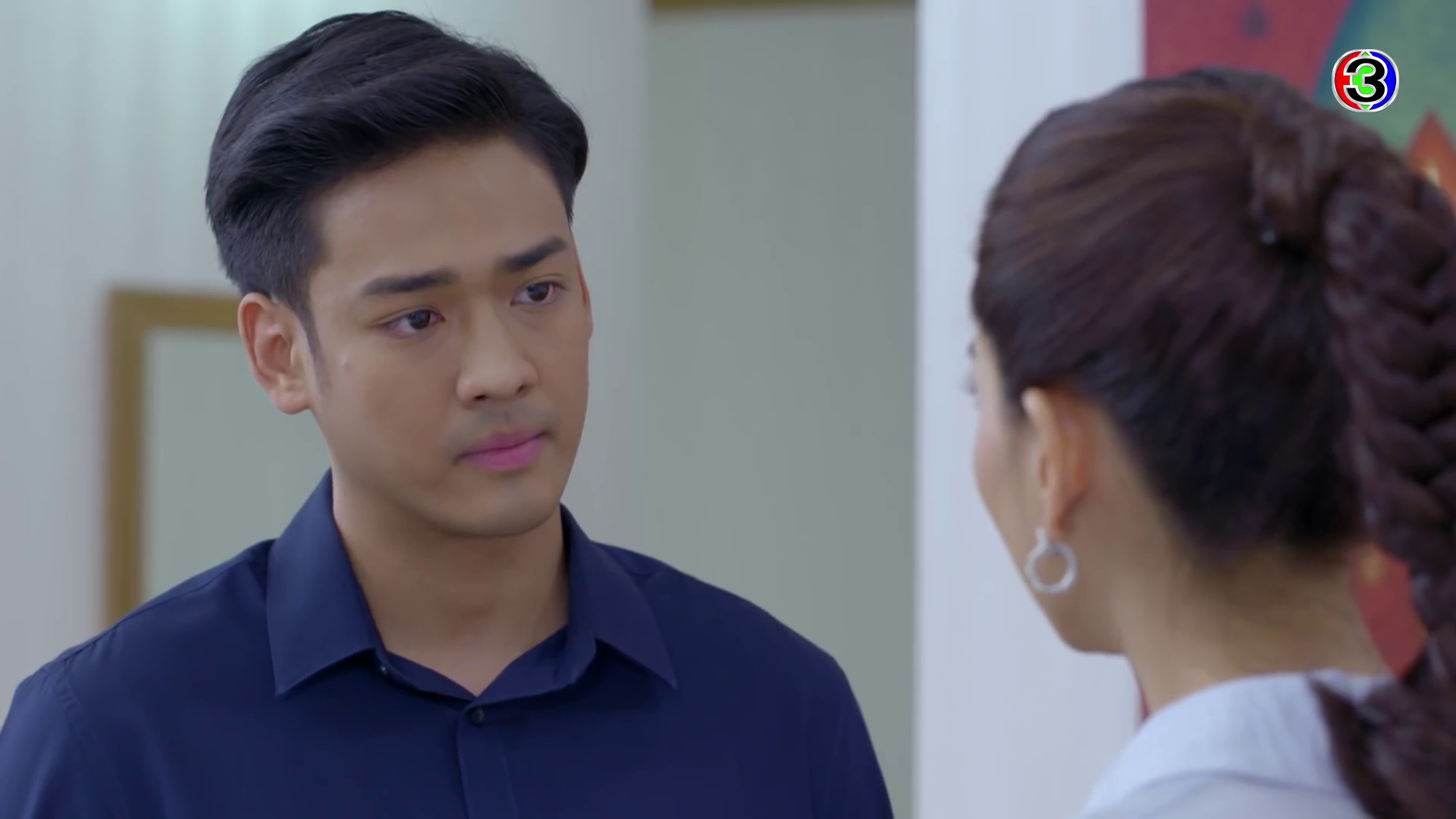
Although it’s quite easy to do so, let’s not forget about P’Krat who loses power, loses his dad (who goes to jail), and loses his fiancé, Sitang, who finally friendzones him in the same brutal manner as Duangkhae did in the past lifetime.
Things get messy when our villains go and double cross each other, with Adul, notably, finally shedding his kind exterior and reveals that he’s the mastermind after all, and proceeds with haste to kill all 9 seals and get the Gala Dewa Idol ready for action. A complication occurs when it is later on revealed that Sitang is actually number 9 as Duangkhae volunteered to take the place of Mae Ging after she becomes unable to participate in the sealing ceremony. This lakorn has a happy ending so Sitang doesn’t die (although Plerng is fooled into thinking that she did – payback for having him die on Sitang’s past incarnations twice, I guess.) and ultimately, the ancient trick is revealed to Pakboon. Though she is literally shookt, as she spent 13 and a half episodes in a blind rage, she quickly (like, 5 mins quick) resolves her internal turmoil and decides to drag the guy who made her life hell, to hell: endless, timeless hell.

Power hungry Adul gets his due when Pakboon goes ballistic and decides to drag him into the time and space warp created by the Gala Dewa Idol where they will be trapped to pay for all the bad karma they’ve created.
Our big bad villains are thus eliminated, our pranangs get a wedding, complete with a cute “unconventional” wedding night, and two epilogues. The first epilogue shows what became of the Gala Dewa Idol.
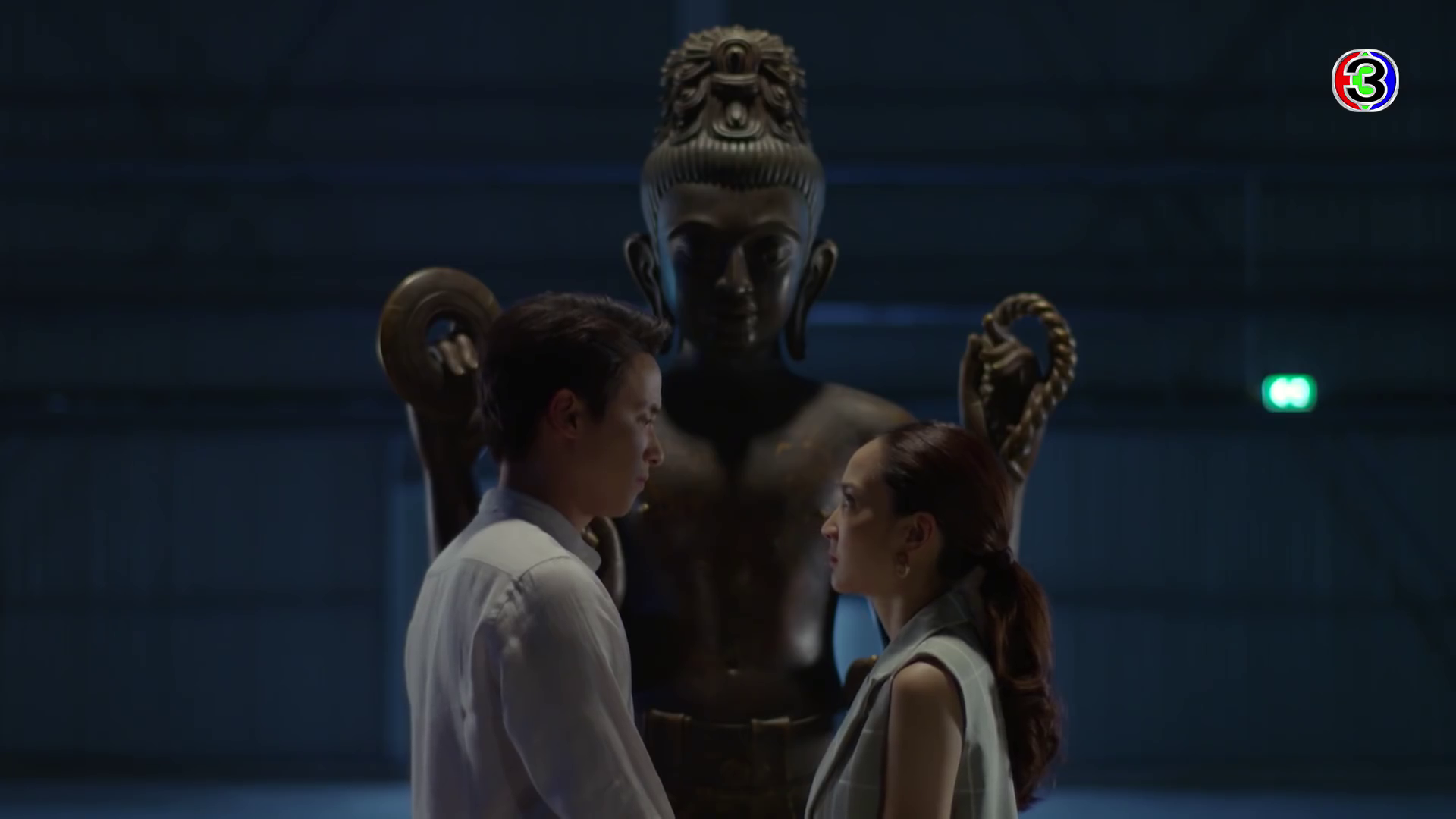
Plerng and Sitang are unable to destroy the idol. Plerng thus vows to make it his life mission to keep the idol away from evil hands and Sitang supports this endeavor wholeheartedly, with her being the only living ninth seal of its power.
The second epilogue is lighter, as it shows Plerng and Sitang’s happy family – something which they finally have after their painful partings in their past lifetimes.

Plerngfah and Sitang’s daughter, Rordao, whose name means “Waiting for stars,” is their pride and joy. Her name symbolizes the period in between the setting of the sun and the rising of the moon.
Although Plerng has lost most, if not all of his power, he nevertheless has a warm family, a good career and things seem peaceful enough – there’s nothing more that he could ask for. Nevertheless, the lakorn ends with the big twist – Rordao turns out to be Plerngfah’s successor, as she acts out in the same way as Plerng did when he was much younger.

While watching the news about a child who was kidnapped, and whose kidnappers were mysteriously killed, Rordao says, “He killed them. That boy killed his kidnappers” – much in the same way that young Plerng said that young Pakboon killed the policeman who adopted her, when he saw the news on tv.
Rordao’s eyes then turn black, thus hinting that she has the same power as Plerngfah – and as the worried parents look on, the screen turns black and shows “The End.”
When asked whether Rordao is the reincarnation of Pakboon and the boy is the reincarnation of Adul, Khun Pin Nathanan, the producer, said that is not the case. Instead, what they wanted to show was that there are other individuals like Plerng, whose past lives’ karma enabled them to be born with this gift of clairvoyance. Whether Rordao would be able to seal the Gala Dewa Idol, or if she would be facing another problem of her own, is left to the viewers’ imaginations. (Although rumor has it that the Author of Leh Ban Pa Kal, Wannawat, has a new book in the works. A sequel, perhaps?)
But in any case, that is how Leh Ban Pa Kal ends. Was the ancient trick and its resolution worth the 14 episodes? Was the whole trouble of going through all those violent scenes worth it? To answer these questions, I again refer to the alternate title of the lakorn, Mist of Love (previously Love in the Mist). Although touted as a mystery thriller, this lakorn is still a lakorn, and thus, love still plays a major part of it. It was downplayed, yes, but ultimately, the core of the lakorn is still a love story. In this sense, Leh Ban Pa Kal still follows the lakorn formula, and then tweaks it. This is what gives life to the lakorn, in my opinion.
While some questions were left unanswered in Episodes 1-6, Episodes 7-14 reveals more about the love story dynamic among our characters.
As I mentioned in the earlier review in relation to episodes 1-6, what better concept may we juxtapose with time, other than love? After all, what can be more powerful than time, if not love? In this lakorn, we learn that it is not only love which can transcend time, but also hatred and avarice – for these two wicked sins have plagued every generation – yet all is not lost, as they can likewise be defeated by both time and love. Time heals all wounds they say, and love can patch things up completely.
In unraveling the love story, first, let’s look at the Creator, the one who started it all, Thao Val. His lust for power ruled his life and caused his death. He was a King, yet instead of benevolently ruling over his people and making their lives better, he instead wished to have more lands, more power, more greatness – and for what? We don’t really know where Thao Val’s insatiable greed for power comes from, as not much is shown regarding his background prior to being a mage and the King of Waisalee. He had neither family, nor a love interest. He just led life as a megalomaniac – on top of the world, but alone in his reign.

He just hates being looked down upon, I guess. It is a trait he shares with Phee Boon and Prof. Adul.
He adopted several children, including the little boy who he called Rawi, and also Thinnasaree. In the same way, Dr. Adul adopted Sitang in the present lifetime, and raised her as his own. Yet to all his children, he said: “It’s not that I didn’t love you. I love you, but I love power more.” Is that even love at all? Ultimately, he caused the death of his wards (as well as his unborn child, care of Thinnasaree) all for the sake of acquiring the power of time. He stopped at nothing and used all powers in his arsenal to get what he wanted. He was scheming and manipulative, deceitful and shameless. His power lies in the darkness – as he concealed wickedness through goodness and vice versa. His blindness spells and his dark arts are one thing, but the ultimate trick of all – taking the image of others (especially that of Rawi) threw everything off the balance and caused chaos all over.
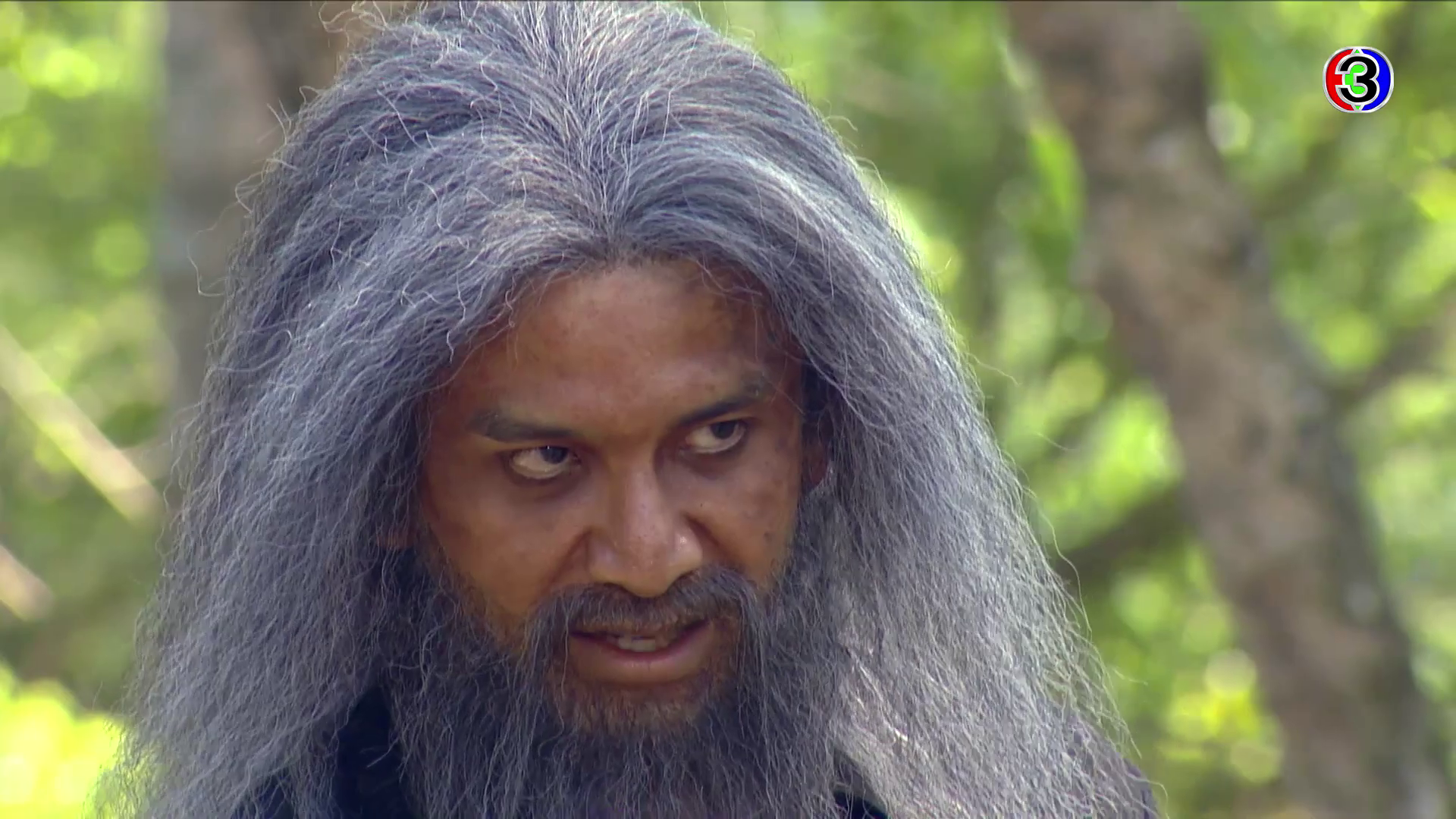
From a king to a despicable hermit, how low Thao Val had fallen due to his past misdeeds. Yet still, he did not learn.
In the Rama V era, Thao Val was reborn as Phee Boon, a warlock of detestable origins. Gone is his grandeur and majesty, instead, Phee Boon was an outcast, forced to deal with nasty things such as scorpions, snakes, and zombies. Still, he lusted for power and sought the Gala Dewa Idol in order to raise his status and be the most powerful of all. His lack of resources forced him to work with the occult, to hide in the shadows and feed vengeful ghosts who he ordered to do his bidding. In the end, he died a quick death when again, he was so near yet so far from the Gala Dewa Idol, having finally possessed it, but not knowing how to release the 9 seals put in place by Khun Uthaiyothin.
In modern times, as Professor Adul, he pretends to be a goody two shoes, only to go batshit crazy in the end as his power tripping goes on an overdrive. Perhaps that had been his worst punishment – to pretend to be good and weak for most of his life, only to fail once he finally unleashes his power. For a man who lusts for power, to pretend to be a man who is subdued due to his love for his wife, Pakboon, and restrained due to his affection for his adopted niece, Sitang, must be the greatest strain. In the end it is revealed that he knew everything all along, and was just pretending to be nice to the one who caused his death (Sasina – Sitang) and wrapped around the little finger of the woman he had tricked all along (Thinnasaree – Pakboon). Ultimately, he was likewise overpowered by his very own student, Rawi-Plerngfah, who merely learned the ropes from him.
After watching the last few episodes of the lakorn, I finally understood why Poh Nattawut was cast as the character of Thao Val. See, this guy isn’t just a villain. He’s a two-faced villain and that’s what makes him even more wicked. To do that, the actor must look convincingly nice, and yet still have the acting chops to be the person we all love to hate. Thankfully, P’Poh does this so well. I remember telling P’Fia my shock when I realized that suddenly, I found myself being drawn to Boring Dr. Adul when he finally showed more character, i.e., his wicked side. P’Fia simply said, “because he’s a pra’ek!” Indeed, P’Poh’s eyes can melt your heart and his smile will throw you off guard and that charisma stays even when he’s killing everyone and not feeling the least bit sorry at all. Perhaps it’s because he’s a veteran that he can pull the switch so well. I’ve been thinking hard about all the Lakorn villains who I’ve watched in the past, and I realize no one can quite fit the bill, other than an actor of P’Poh’s caliber. So now I get it. I get why he was cast as the ultimate big bad of this lakorn.

He easily plays the Dr. Jekyll and Mr. Hyde role, and I wonder if Dr. Adul is really beyond redemption when he’s so good at playing a good guy when he actually prefers to swing to the bad side.
Is Thao Val/Phee Boon/Dr. Adul bad to the core? With P’Poh’s portrayal, I’m not sure. A big part of his character, especially as Dr. Adul, is duality – he can show you one thing but mean another. The viewer is left in the dark. Again, his two-facedness is darkness in itself. In the modern times, he didn’t even have to change his face. The boring goody-two shoes Dr. Adul was such a good actor that he got me fooled.
Insofar as Thao Val/Phee Boon/Dr. Adul is concerned, all that’s clear is that he lusts for power more than anything. His megalomania is the both the drive of his character, as well as its weakness – for it is where his motivation begins and ends.
If Thao Val/Phee Boon/Dr. Adul is linear as a character, I can say Thinnasaree is a star with all the ups, downs and turns of her character. She is first shown as the enigmatic Pakboon, then the vengeful Boonlhua, and then finally, we get her backstory as the pure and bright Thinnasaree. In some ways, Thinnasaree was shown as more beautiful and more delicate than Sasina, for she had the qualities of the traditional princess – caring, kind, and gentle. She was called an angel on earth, and her beauty was unparalleled – and yet why did she have to suffer the misfortune of unrequited love? Her origins with Rawi was played out in the same way as it happened with Sitang and Plerghfah. They were childhood friends and survived everything together. In addition, they learned that she was Rawi’s wife in their previous lifetime. Yet why was it that she could not be the apple of Rawi’s eye? Was she perhaps too perfect, too kind, too beautiful to be of this earth and to deserve Rawi’s love?
Sadly, the tragedy of Thinnasaree’s character is that the very love she had for Rawi, instead of making her strong, made her weak instead. It made her complacent and stagnant. Her greatest sin was that she loved too much; and then we wonder yet again, was it love after all?

How sad is it that she had been pining for him for several lifetimes, but he was just not into her each time?
Thinnasaree’s name means “the lady who always gives”. Quite an ironic name for a villain. Yet, again, viewers are confronted with the question, is she really a villain, or a victim instead? The cheesy way to put it is that she’s a victim of love. She is beholden to all those who have shown her love, may it be Rawi or Thao Val, that she completely lost herself. Indeed, she always gave and left nothing for herself. This is hinted early on in her scene with an injured rabbit, where, at the risk of getting sick, she used her power to heal the rabbit and Rawi warned that she should have just used medicine instead of using her powers as it might cause her harm. She replied, “I don’t want it to suffer, and the medicine takes time to take effect.” She is one who is willing to give everything, all at once even when love is supposed to be patient, even when love takes time.

Rawi’s unrequited love turns out to be the bitter pill to chew on. Instead of healing her however, it turned into a poison.
She cannot accept life without Rawi, and everything she did revolved around him. She learned Achanajak and risked her life because Rawi was willing to learn it as well (and he was willing to risk his life, not for her or for the sake of learning but as repayment to their teacher, Thao Val, mind you.) She was willing to serve as queen of the Waisalee because Rawi would be the King. Even when she learned that Rawi was seeing the light and wanted to leave Waisalee due to the injustices that they and their friends had suffered, still, Thinnasaree was determined to turn a blind eye and let things be, as long as she and Rawi can be together.
Thinnasaree’s flaw is that she was steadfast, too steadfast, that she lost sight of everything else. As a concept repeatedly stated in the lakorn, relationships are not just about love, it’s about suitability as well. Lovers should have the same wisdom, same kindness and disposition, same generosity and same outlook – Thinnasaree was left behind by Rawi in these aspects without her being aware. Instead of growing with him however, she stayed behind and pulled him back. This is why despite her being on the same level with Sasina, and in some aspects more superior than her, still, she was unable to win Rawi’s love.

Thinnasaree was presented as a gentle beauty while Sasina was a fierce warrior who held weapons instead of needles. Normally, Thinnasaree would be the no-brainer choice of a quiet mage as a wife. But instead, Rawi ends up head over heels in love with Sasina even after spending just a few days with her.
Rawi told Thinnasaree not to hold on to the past, as it has passed and a new life meant a new chance – notably, he tells Sitang the reverse and claims they’ve been lovers in so many lifetimes that she shouldn’t go against it and should just let things be – so what of it?! This “forever” concept works for Sitang but not for Thinnasaree? Well, I’d like to think that Rawi wasn’t being a jerk. What happened was that Thinnasaree lived only for others and not for herself. This lack of growth, self-respect and self-dignity thus made her unequal with Rawi, or even Uthaiyothin and Plerngfah. Thus, holding on to the past, just that and nothing more, was not enough to make her worthy of Rawi’s love.

Uthai acknowledged that Boonlhua could have been equal with Duangkhae in every way, except for the fact that he loved only Duangkhae and had no room in his heart for her.
This is made even more obvious in Uthaiyothin’s lifetime, when Boonlhua confronted him and asked why he could not make her his wife. Boonlhua claimed that she did not even aspire to be the first wife, even being a mistress will do, as long as they can be together. In this lifetime, she was not in the same level as Duangkhae but still, Uthai told her that he cannot love her, not because she was less beautiful or because she was not of noble birth, but only because he had given his love to Duangkhae wholeheartedly. Duangkhae was number one, and the only.
In the end, this supposedly pure and undying love of Thinnasaree and Boonhlua were used by Thao Val and Phee Boon to their advantage. If Thao Val had been the darkness, I would compare Thinnasaree to the light of day, where she basked in the light of the sun. She was so pure however, that just one trick took her sunshine away, and there in the darkness she remained for the rest of the lakorn. Her innocence and naivete were used against her and turned her into a monster who was ready and willing to destroy everything, including herself. This is why Thinnasaree, the kind and pure Thinnasaree turned into “The Destroyer”.
To reiterate, Thinnasaree’s steadfastness became her flaw when love was replaced by hatred. If you think about it, Thao Val’s trick wouldn’t have worked if she only had more discernment. How can Rawi, who she knew all her life, do a 180 degree turn in one night? He told her unequivocally that he loved someone else, yet just a few words of love and a kiss here and there made her believe otherwise. Sure, she did not have enough powers to know that Thao Val was playing tricks on her, but perhaps, it really was her weakness of mind that made her a victim, not just in this lifetime, but also in the succeeding ones, when time and again, the enemy manipulated her and fed her lies which she gobbled up willingly. When it was time to pull the trigger, she did so willingly, and with aplomb. She was like a suicide bomber who was intent only on destroying, throwing away all her kindness and gentleness to get vengeance for her scorned heart. Her main gripe was that she did not want Rawi and Sasina to be happy while she remained in Waisalee, suffering her pitiful fate. Succinctly, she simply cannot move on, so she would not let them move on either. And in the end, where does that bring her? After everything is lost and destroyed, she is still left alone – no different from Thao Val’s fate at the top.
The saddest part is that, it’s not even that Rawi did not love her. In fact, he did. He cared for her deeply, just not as a lover. One of the most touching scenes in the lakorn was when Rawi rode out in haste to try to stop Thinnasaree from dying, only to see that he was too late. He mourned the loss of his friend and cried, “Thinnasaree, why did it have to be you?”. This love and affection transcended lifetimes, that even when Thinnasaree’s future incarnations wreaked havoc, Rawi, Uthaiyothin and Plerngfah still did not find it in their hearts to hate her completely. Perhaps it’s poetic justice that by going through the wicked curse, Thinnasaree managed to spend hundreds of years with Rawi’s soul, trapped in the Gala Dewa Idol, only for them to part ways once they were reborn once more.
Also, another tragedy is that Pakboon finds herself with an unrequited lover herself, in the person of Pruek. Pruek, her handy henchman turns out to be Seal number 8 who had to be killed to harness the power of the Gala Dewa Idol. Like her, he was weak and held on to Pakboon to make his life worth living. He did not aspire to be her lover, knowing full well that he fell in love with a married woman, but still, he wanted nothing but the best for her, that he was willing to live, kill and die for her. Tragically, even after learning that she had been using him, he still could not find it in his heart to kill her due to his love for her – something which Thinnasaree wasn’t even capable of doing. Remember, Thinnasaree caused Rawi’s ruin after she thought that he cast her aside. Pruek on the other hand still wished her well even though he knew that she wanted him dead. Was Pruek purer than Pakboon then? Or did Pruek have an inkling that Pakboon didn’t really mean what she said? In any case, Pruek coaxes Pakboon to run away from everything and forget about the Gala Dewa Idol. He wanted her to have a better fate in this lifetime, but instead, she realizes too late that he was right all along.

In the end, Adul shoots the only man who truly loved her the way she wanted to be loved. Instead of reiterating his love, on his dying breath, he instead says “Run away!” – showing that more than love, he cared for her wellbeing most of all.
I thus wonder, had Boonhlua met Pruek in the Rama V period, would things have been different in the present time? We’ll never know. But in any case, Pakboon ends up redeeming herself in the end as she drags Adul into the time and space warp created by the Gala Dewa Idol, thus sealing them inside to pay for their sins. It’s a tragic but apt end for her, really. A woman who was so hung up on a guy, who had a steadfast devotion and a constant hatred – gets stuck in the Gala Dewa Idol which holds time itself. Indeed, in the vastness of time, we have this steady fixture, Thinnasaree/Boonhlua/Pakboon, whose main flaw was her failure to let time pass, move on and let go.
Boom Suphaporn gave so much life to the character of Thinnasaree/Boonhlua/Pakboon. She was so complex that Meredith Brook’s song “Bitch” could have been her theme song (“I’m a bitch, I’m a lover, I’m a child, I’m a mother, I’m a sinner, I’m a saint, I do not feel ashamed.I’m your Hell, I’m your dream. I’m nothing in between. You know you wouldn’t want it any other way.”) She’s patterned after the pitiful second lead in a Korean drama who you wish had a happy ending, but instead, leaves you with a lasting impression. What I liked most of all is that she’s so beautiful and graceful and had that tenderness in her that she looks so pitiful even when she’s being the baddest biatch in the land. I am not sure if she had more screen time than the Nang’ek, but it certainly felt that way because the complexity of her character made me see her in so many different lights. The love story she had with Pruek in the end was also a surprise, and that scene with her and Pruek as he was dying tugged at the heartstrings because she could have had a happy ending, she could have been the Nang’ek in her own story, but her character needed to turn a full circle. (On that note, it was good to see Pai Visaroot as a genuinely good character. He was typecast as a thug or villain due to his nice even tan and burly body, but actually his eyes can have that very cute and innocent look. I can never forget him as the adorable P’Klao in Khun Chai Pawonruj.)
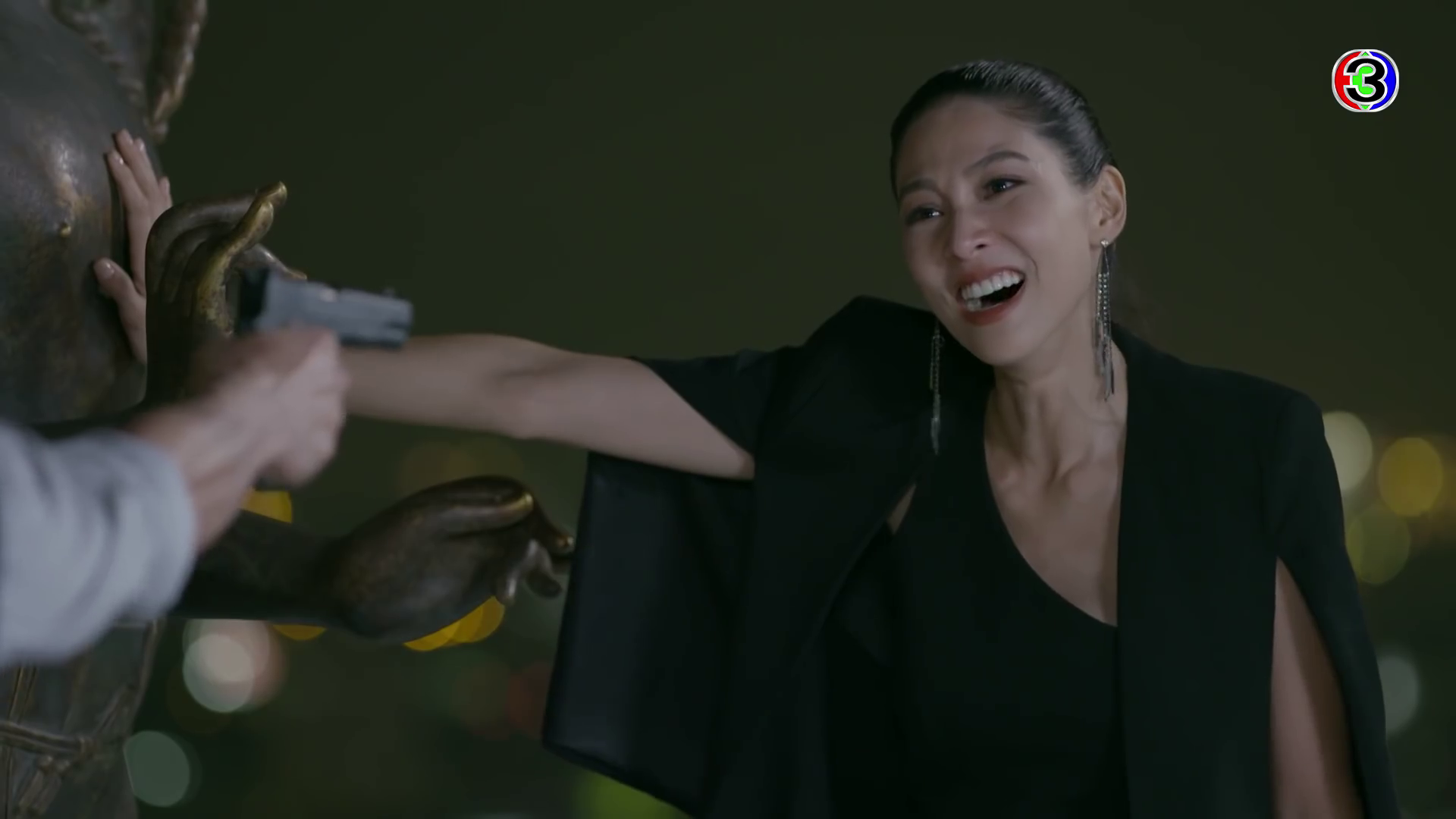
Pakboon was no longer that pure hearted girl who Thao Val had manipulated. She was her own woman now, complete with her strengths and flaws, and ready to take matters in her own hands.
But her best scene of all is her last, where she finally realized that she was played. Of course, it was a bit frustrating that the rage she had for 13 and a half episodes was resolved in 5 minutes, but Boom’s tearful but wicked eyes and her defeated yet free laugh made it all work. She ended as a power woman. Boom is definitely an actress to watch out for, and I believe she’ll have more starring roles in the future.
It’s a bit disheartening to have our Nang’ek called “the Loser” – not because she had lost the battle, but because she stood to lose everything in each lifetime, due to the Gala Dewa Idol. She is the innocent bystander who was shot by a stray bullet in the grand scheme of things. If you think about it, she really had nothing to do with the Gala Dewa Idol, and her only connection to it was being Rawi’s lover. If she had wanted an easier life, the best approach would have been to stay as far away from Rawi/Uthaiyothin/Plerngfah as possible. But what can she do when she’s in love – and indeed, having Rawi/Uthaiyothin/Plerngfah, even just for a short while, is a just reward for having to deal with the whole mess brought about by the Gala Dewa Idol. I guess Sasina goes by the cliché, it’s better to have love and lost than to never have loved at all.
Yet despite being called the “loser”, Sasina was shown as a power woman in all her lifetimes. She was not weak nor did she break under any circumstance. I liked her the most as Sasina, the feisty warrior princess. Notably, she was shown with piercing dark eyes in this lifetime, that Thinnasaree looked much more beautiful than her, yet still, she managed to capture the heart and put a smile on the face of the seemingly unfeeling Rawi. She was cold hearted and calculating as a warrior, but warm and sweet to the core – qualities which she shared with Sitang.

Rawi used his power to see Sasina’s past incarnation and saw that she was born as a tiger – “No wonder she’s so fierce,” he said.
But what makes her so endearing that she won Rawi’s heart over Thinnasaree? Did she really just have the power of destiny to back her up? If you recall, my gripe in episodes 1-6 had been there is not much development between Plerng and Sitang, and Uthai and Duangkhae’s relationship. The viewer is just made to accept that they are “meant to be.” While that is still the approach given to us in episodes 7-14, there is something much more, especially in the flashback scenes between Rawi and Sasina. See, Sasina, unlike Thinnasaree, is multi-faceted and dynamic. She can be a warrior princess, but she can be a gentle lady as well. She was willing to change and learn a new trick or two. As Rawi notes, Sasina changed Rawi’s life that it’s no longer the same as before. While Thinnasaree was constant, and almost stagnant, Sasina gave Rawi room to grow, and indeed, the two of them grew together.
My favorite line of Sasina’s was when Rawi was going to say goodbye as he leaves to return to Waisalee, he tells her to wait for his return. She replies that no, she will not wait for him, but instead, she will march over there and get him back herself. This dedication of hers to pull her lover out of the darkness and to let him walk with her in the light makes her the ideal partner.
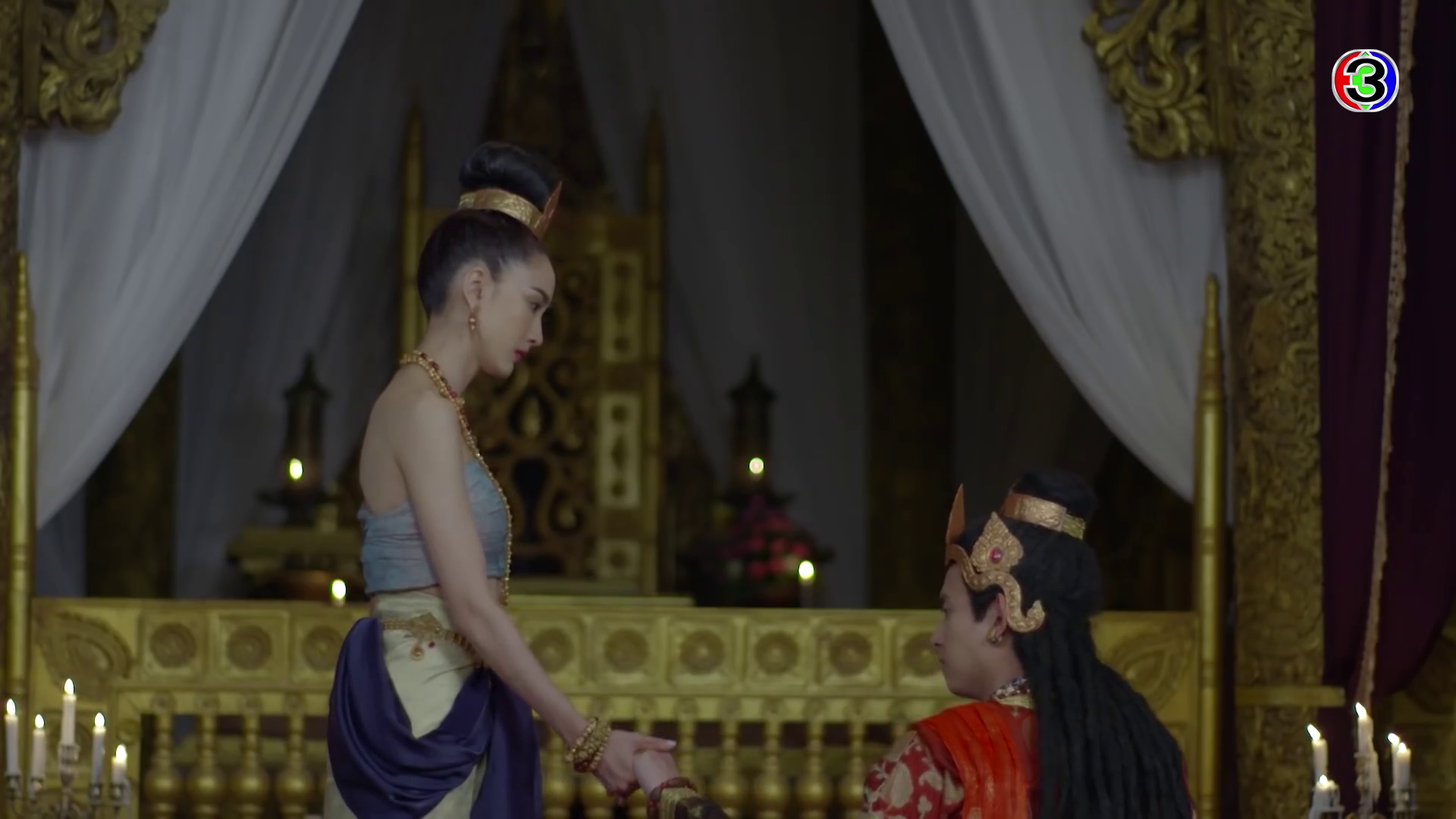
When Rawi was down in the dumps, Sasina told him to man up, and pulled him back up to his feet. Her future incarnations do the same as she provides steady support to our pra’ek.
In Duangkhae’s lifetime, despite Uthai’s death, she carried on not only to take care of their infant child, but also to ensure that the Gala Dewa Idol falls into the right hands (i.e. Plerngfah’s in the future.) She did not fall into despair and even when she admitted she wanted to, she did not kill herself, unlike what Thinnasaree did in her previous lifetime. Sasina and Duangkhae knew that they had a mission to continue their husband’s missions and this not only bound them with their husbands, but also protected their husbands’ legacy.
Sasina and Duangkhae left their own personal marks on the Gala Dewa Idol in that they “altered” it, so to speak. Sasina left the engraved vow on its feet that she will follow Rawi in every lifetime, while Duangkhae made an ardent prayer to let the Gala Dewa find its way to Uthaiyothin each time. Duangkhae likewise sealed the Gala Dewa Idol thus making Sitang’s life the lock to keep the Gala Dewa safe for the present lifetime. Indeed, Sasina/Duangkhae lost their husbands to the Gala Dewa Idol, and Sitang is at risk of losing her life, but they did so with a price. Sasina was able to save the kingdom of Aruna while Duangkhae was able to save her child so that Plerngfah could eventually be born. Also, of the four, Sasina/Duanghkae/Sitang were the only ones who were not able to open their third eyes and were just mere mortals, yet in the end, it is their prayer and dedication that saves us all.
I’ve discussed Leh Ban Pa Kal with my friends, and their common sentiment is that, Sasina/Sitang came off as characters who are “too strong” or “too smart”. They complained that Sitang was cleverer than Plerng in some parts of the story when in the book version, she was not that pivotal of a character. My take on this is that the screenplay writer heavily emphasized on the equality between Sitang and Plerng not only as lovers but also as life partners/soulmates– i.e. love was not the only factor in a relationship. They needed to have equality in several other aspects. It is a concept I first saw in Padiwaradda. Like in Padiwaradda as well, there was a point about how the ideal wife supported her husband’s work, thereby making it her own. We see this in the relationship between the nang’ek and pra’ek in this lakorn, in all their lifetimes. That Sitang is clever is only a reflection of how she deserves to be with Plerng, and Plerng deserves nothing less than clever and resourceful Sitang.
It’s pretty obvious that Sasina and Sitang are fierce. Yet the sweet and gentle Duangkhae had her own moment of fierceness as well – and that was when she epically friendzoned Phor Itthiwongsa or Krat’s ancestor. In the same, if not more brutal manner, Sitang likewise friendzoned and pulled the friendship over card with Krat. Phor Wong and Krat came too late in the day and that’s what’s so pitiful about him. He’s always in second place and pales in comparison to the great and awesome Uthaiyothin and Plernghfah. Even when Uthai’s spirit came to Duangkhae to mediate in his behalf, still, Duangkhae found Phor Wong to be wanting. In modern times, he has his whole life ahead of him. He is a young politician set for greatness. Between him and a reporter like Plerngfah, Krat seemed to be the winner this time around. Nevertheless, time and again, Krat in this lifetime takes the easy way out instead of making a good name for himself. Truly Krat’s character emphasizes that it is not enough to be “there” for the person you are pining for. One has to be inherently good as well in order to deserve being with an equally good person. Ultimately, he dies as a loser, a real loser, when he decides to appropriate the power of time for himself. Perhaps he had been fed up with being talked down on by Sitang that he finally aspired greatness, even through underhanded means. He still falls short however, as one touch on the Gala Dewa Idol sends him to his literally bloody death.
Taew was good in this role as Sasina/Duangkhae/Sitang. What is special is that she gets to play a feisty character as Sasina, a gentle lady as Duangkhae and a cute smarty pants as Sitang. Notably, the producers seem to have watched Game Sanaeha closely as many of Nai and Nok’s romantic scenes were replayed in Leh Ban Pa Kal, but thankfully, Sitang wasn’t as high-strung and bratty as Nok. Sure, she kept on physically abusing Plerngfah, but actually, in those scenes where she had to be sweet, she truly was sweet – that even when Plerng was being so sappy, the learned professor Sitang still had that relatable fangirl smile she had wanted so much to suppress but fails miserably.
Of the four, Taew’s character had the least development for she was the traditional nang’ek – bullied at times, fighting at times, but always there to support the pra’ek and receive his love. The shaken and in-love stares she gave the pra’ek, the playing hard to get, and of course, the anguished scenes where she suffered his death, were delivered with ease by Taew. I suppose my only critique was that what we saw in Sasina/Duangkhae and Sitang were things that we’ve seen done by Taew before, but then again, that’s her hustle – and she does it well, so in the end, it works!
I don’t know if it’s just my bias talking, but the hero in this lakorn is actually the Pra’ek. Normally, in the lakorns that I’ve watched, the story focuses on either the Nang’ek or both the Pra’ek and Nang’ek equally. I might get some backlash with this, but to me, from episode 1, it is clear that it’s James’s show, and Taew was his support and she did well as such. This is the first time that I’ve seen this dynamic with regard to Taew, as her roles as of late have her as the star of the show. In any case, it’s not a bad thing because like in a game of basketball, the shooter cannot perform well without a point guard– and what a good point guard Taew had been in this lakorn.
So now, it’s time to discuss the hero. Are you guys ready? I’ll try to keep this as short as I can, though quite frankly, if I have to talk about James’s performance in this lakorn, I might actually end up making a thesis.
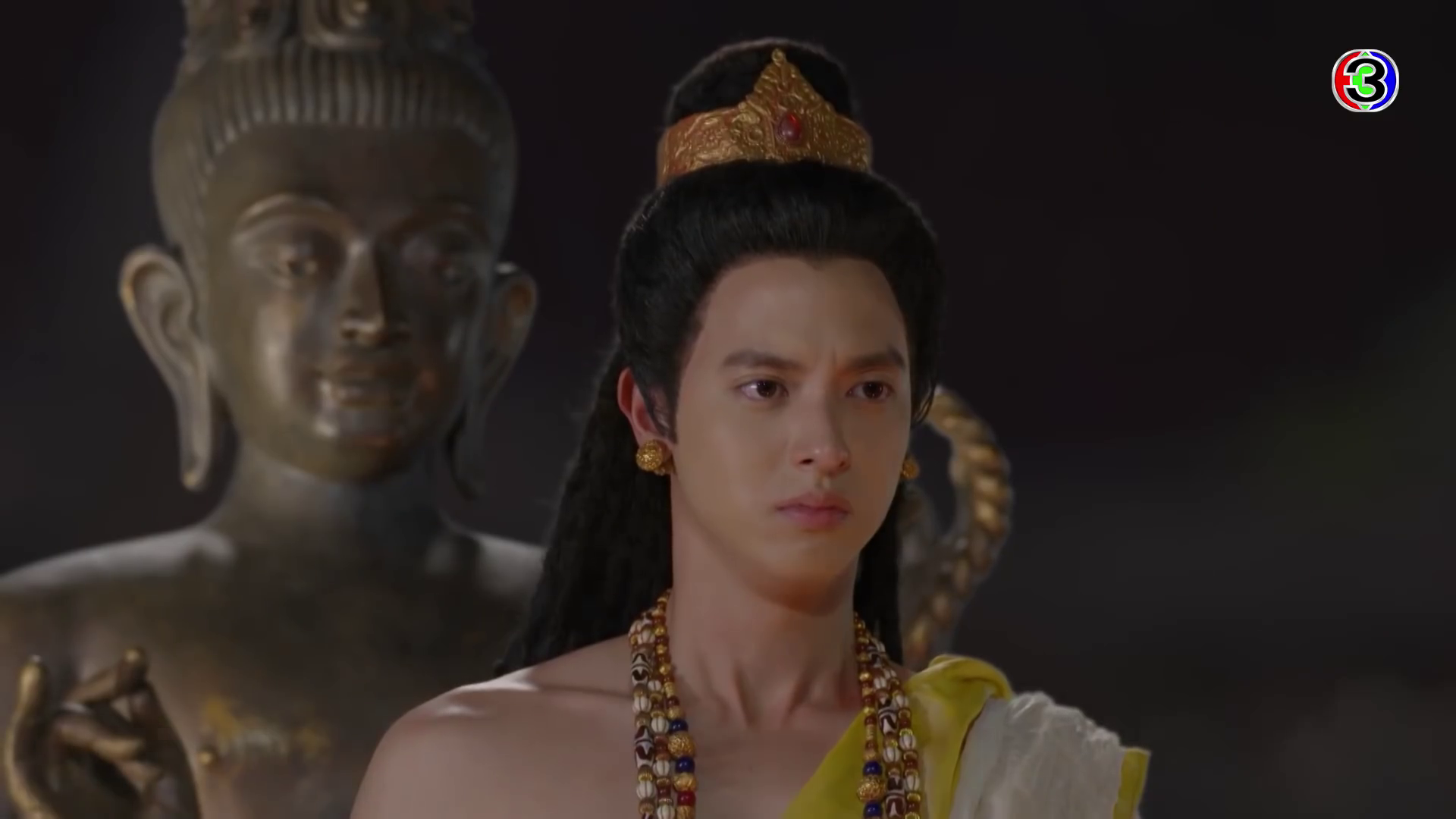
Rawi never wanted to have anything to do with the Gala Dewa Idol, nevertheless, his inherent greatness made him The Protector.
First, let’s go back to the story. I’ve discussed the Creator who was the ultimate big bad, the Destroyer, who was the third wheel/second lead, and the Loser who is the love interest. Our main event, Rawi, is the one who tied all these characters together. Rawi was naturally gifted with high intellect and innate righteousness that he became a worthy sacrifice to complete the Gala Dewa Idol. Like Yin and Yang, he balanced out Thinnasaree’s corruption and hatred with determination and love. He started out as a nameless orphan who had nothing but his guts, until he grew up to be a fine young man who observed everything around him with eyes wide open. While his peers sought to be the apple of Thao Val’s eye, Rawi instead saw the pitiful state that Waisalee’s people were in and sees it as a reflection of himself – easily, he realizes that the ostensible comfort and protection given by his teacher, Thao Val was nothing but an empty and shallow shelter. Thao Val’s never-ending quest for power just made him lose his friends, first by making them turn against him, and eventually by causing their deaths. If he did not break free, Rawi knew that he risked losing his own dignity as he was being groomed to be a pawn in Thao Val’s game. Despite his debt of gratitude to his teacher therefore, he gathered his strength to pack up and leave.
Meeting Sasina and seeing Aruna opened his eyes to a brighter world, and he realized that there was more to life than being Thao Val’s pawn. Indeed, his life was never the same and there was no turning back. Perhaps his only mistake had been overestimating his best friend’s strength and underestimating Thao Val’s wickedness. Unbeknownst to him, his determination to lead a better life caused matters to spiral down for the worst.
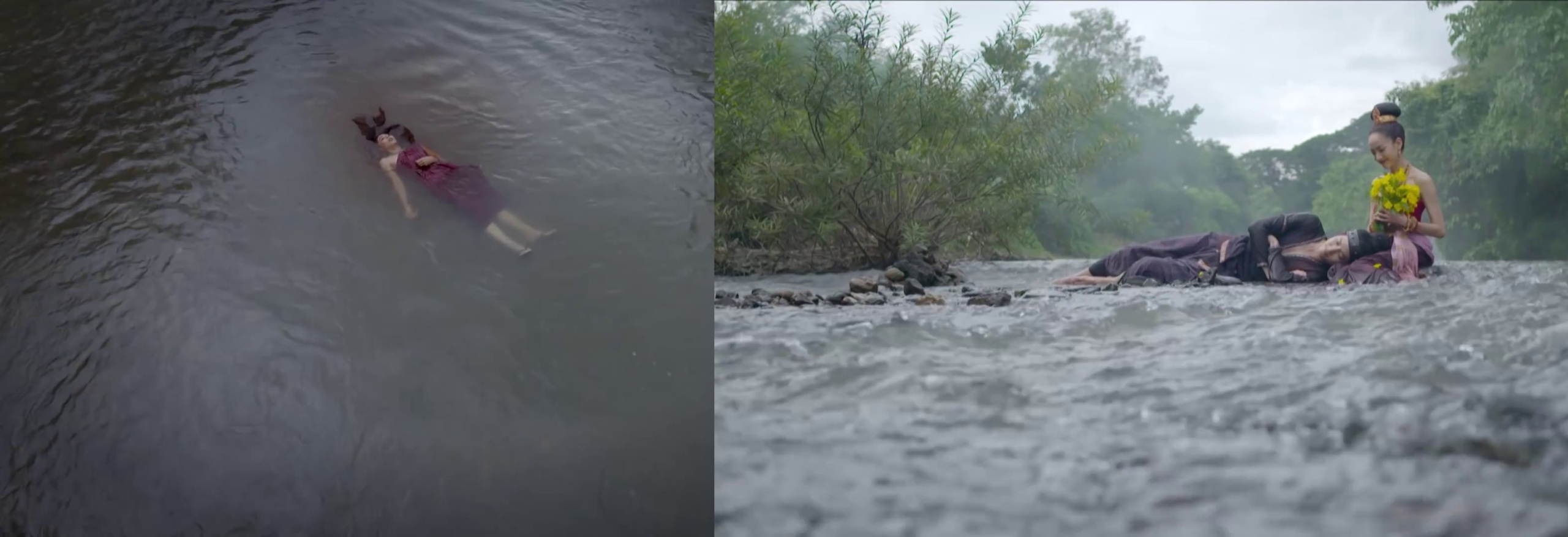
I don’t want to say that Rawi is an insensitive clout, but as he found his love growing in the tide (which, as I earlier mentioned, often symbolized the passing of time) he did not realize that Thinnasaree (in her previous life) had killed herself out of despair in the same waters, due to her lost love.
His love for Sasina had been the catalyst in Thao Val’s ploy. It caused Rawi to reject Thinnasaree, and it is the same love that likewise drove him to sacrifice his life and soul to the Gala Dewa Idol thus making it complete. But can we fault Rawi for this love, when it is what made him truly live to begin with? For one thing, we would not have a story, had Rawi not loved Sasina in the first place. From this perspective, we can see that it isn’t really just Rawi’s soul that completed the Gala Dewa Idol. Ultimately, the Gala Dewa Idol was completed by virtue of his boundless love – the love that shall never die, as his theme song states. There you have it, that’s “forever” in this lakorn, tied up with the power of time.
But still we haven’t answered the question, how did Rawi/Uthaiyothin/Plerngfah become “the Protector” – what is he protecting and how did he protect it?
In his different lifetimes, Rawi changed as well. First, as a man gifted with magical prowess, it became his bounden duty to protect the weak. Ultimately, he sacrificed himself to protect his wife and his new home, Aruna. When he was reborn, he became a nobleman, Khun Uthaiyothin, who not only had to protect his country from certain evils, but he had to protect the Gala Dewa Idol itself from falling into the wrong hands. He thus sealed it with nine lives whose only common denominators had been that they were born on “auspicious” dates. Yet, these nine persons came from different walks of life and had different reasons for agreeing to Uthai’s plan. Some were in it for the money, some had an inkling that they were doing good, some had no idea what was going on, while some were really intent on giving their lives for the common good. In any case, Uthai gave “power to the people” so to speak, that his own power is downplayed, and instead the innate power and goodness of ordinary men is highlighted instead.
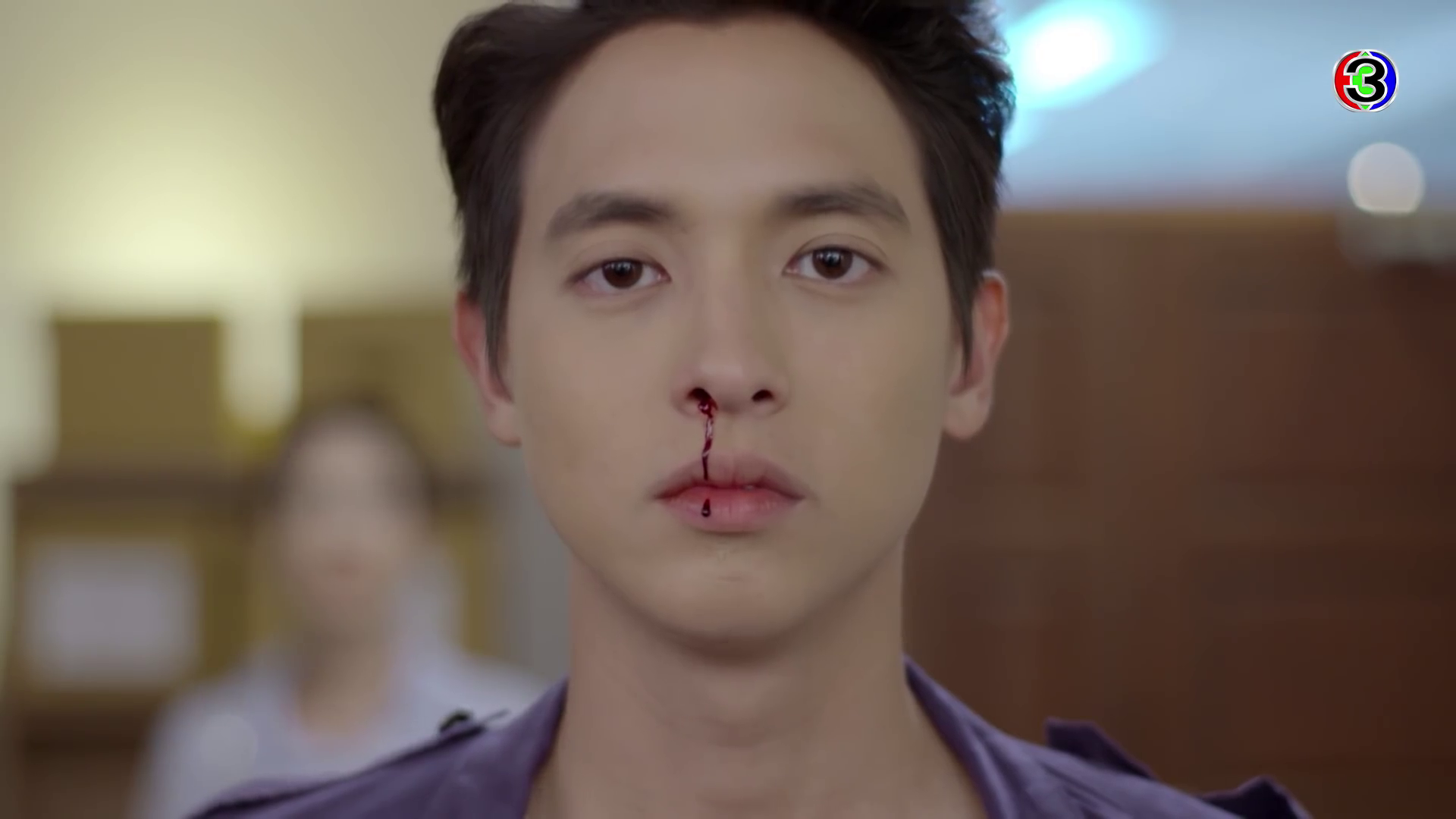
And then we have Plerngfah who probably nosebleeds and faints more than any other pra’ek in the history of pra’eks.
Lastly, we have Plerngfah, who is presented as a jolly good guy who gets beaten and looks scared at fist fights, but still fights nonetheless. Indeed, he is a normal guy, and if I may borrow a lakorn title, he is only a man, not a magician! In all his previous incarnations, he loses a part of himself, until finally we are presented with the bare and mortal Plerngfah who is in a bind for the most part of the lakorn – but mind you, this does not make him a lesser man compared to Rawi and Uthaiyothin. In fact, I would like to say that Plerngfah’s the most admirable of all. Remember, Rawi, despite being a powerful mage, had a limited view of the world and thus found no other solution other than to sacrifice himself to the idol. Uthaiyothin is much worse, as when he first touched the Gala Dewa Idol and saw what was in store for him and his loved ones, he had a blue screen of death and practically lay catatonic in his bed for a month. Plerngfah has his moments, but at the end of the day, he forges on blindly but courageously as he desperately seeks to stop the chaos. What is worse is that these people who were put in danger (and were eventually killed) turned out to be close to him in this lifetime but he had to move forward despite the death of his friends, colleagues, and people who he learned to admire. Though he barely had powers, and though he wasn’t a nobleman in the current lifetime, he still pushed forward, with a smile. His greatest power perhaps is his sunny disposition and his sense of humor. Despite everything, he did not turn out to be brooding or somber unlike his previous incarnations, deaths of his loved ones notwithstanding.
Like Pakboon, he could have dropped everything and moved away, yet he stayed as he knew it was the right thing to do. Plerngfah was rewarded in the end as he finally got the family that Rawi had always wished for, and saw the child which Uthaiyothin had desperately wanted to see. But with it comes the challenge of continuing to protect not just the Gala Dewa Idol, but also his wife – and eventually we learn that he has to protect his successor, his daughter as well, but I’m pretty sure that it’s a small price to pay for the happiness that he has finally unlocked in this lifetime.

A review of the lakorn won’t be complete, without discussing this guy right here, James Jirayu who played the three main roles. I beg your indulgence here as I go on full fangirl mode.
Who would have thought that Khun Chai Puttipat would come this far in such a short period of time? That’s what I thought as I watched James in Leh Ban Pa Kal. This lakorn, at this point in time, seems to be James’s dissertation as an actor as he brought to life characters which he had played before, but upped the ante by several notches. While his triple roles as Rawi, Uthaiyothin and Plerngfah are traditional Pra’ek roles, just in the same way as Taew’s roles are n’ek roles, as I discussed earlier, what made James more exemplary is that there is a jump in his acting skill and it shows in this lakorn. The role of Rawi for example, James looks almost godlike, as though he were an ancient statue that was molded by a skilled artisan and came to life – yet his expressions weren’t stony at all. His grace and refinement as Rawi made me think … when did James become THIS handsome? He has always been cute in my book, but never as manly and handsome till he played Rawi.
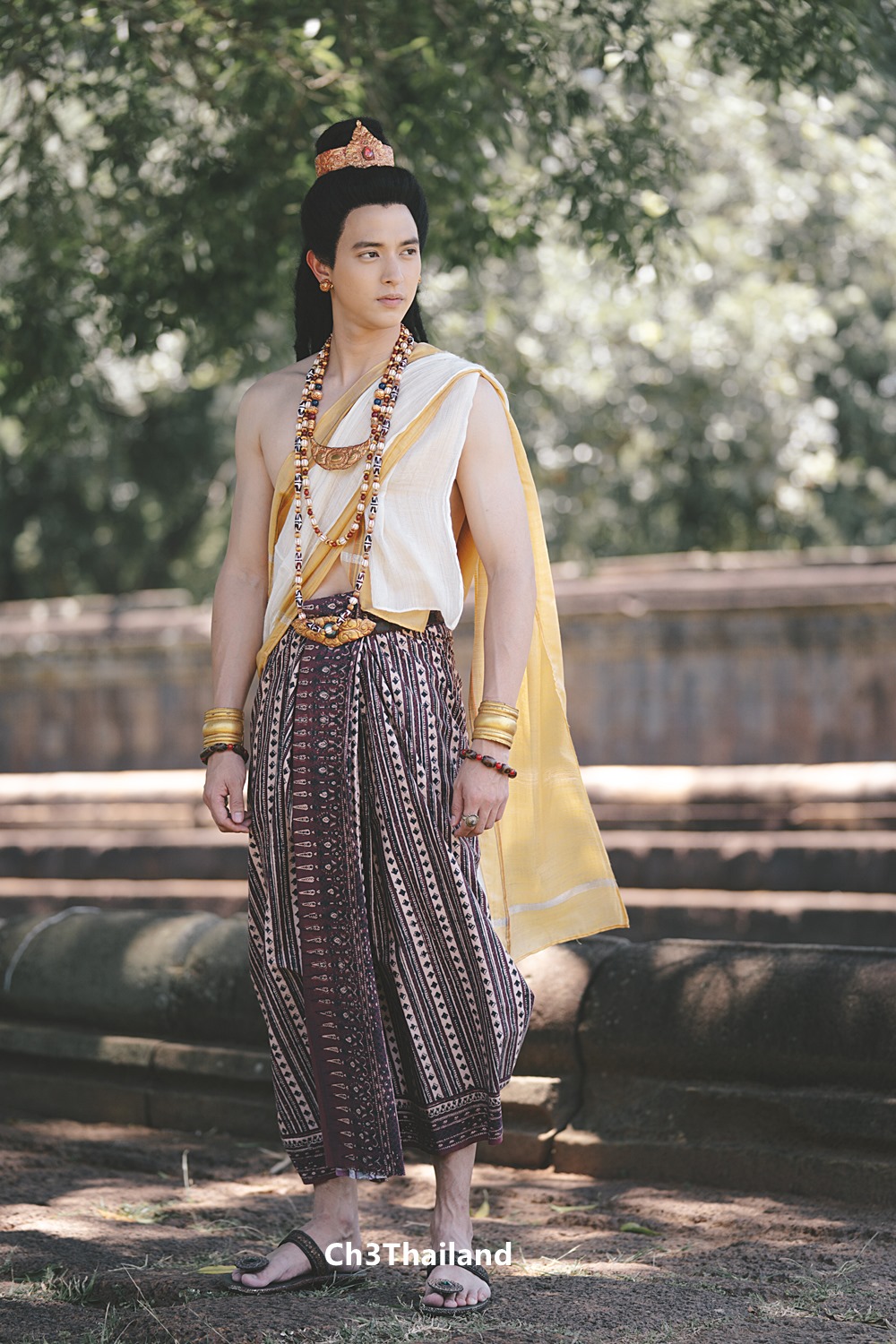
Rawi is reminiscent of Aok Pra Sri Khanthin, in that he had to act with the almost lofty elegance of a courtier. Yet he still had to be relatable and vulnerable in those scenes when he had to deal with his tragic fate.
The best part of Rawi is when James had to play the Fake Rawi. The nuance was very subtle but one can easily see that James had copied some of Thao Val’s mannerisms when he played the Ancient Trick which is the very central conflict of the lakorn.

First compare Rawi with Fake Rawi. Note that whenever Rawi talked to Thinnasaree, at least when they weren’t fighting, he had a gentle expression, with his head slightly angled down so they can look at the same eye level. As Fake Rawi, his head is angled up and looking down, like a king talking to his subject.
Then we were likewise presented with the noble and honorable Uthaiyothin. This role is reminiscent of his gentleman roles, Chai Pat and Nueng. But instead of being a stuck up and grumpy gentleman, we see his tender side (a Ramet and Luckanai in there, I suppose) so he melts hearts all over again. Though most girls would probably remember his topless scenes, the best scene for me is when Uthai was about to die. That whole sequence had a roller coaster of emotions. He was tender and vulnerable when he sent Duangkhae away, and then playful and mocking when he finally died in Boonlhua’s hands.
Then finally, we have Plerngfah, my favorite among the three. As I said before, he is like Asa, in that he was bright and sunny – but also quite playful, so I guess, he’s like Asa, Ittirit and Saran all merged together – but still, that’s an inaccurate statement. Plerngfah is a new character altogether because he is actually very light, very natural but still shamelessly flirty.
I noticed that Rawi had James’s natural gracefulness, while Uthaiyothin was brought to life by his natural acting, but Plerng was brought to life by his natural charm. Plerng is a comedian for the most part, as he has these comic expressions that you don’t normally see in a pra’ek. While he has the least amount of powers, he is the most human and that’s what makes him the most endearing.
So, is there any objective critique I have to say about James in this lakorn? Well… I really can’t think of anything! This lakorn is his showcase. He sang, he danced, he fought, he told jokes, I think the only thing he didn’t do was cook, and that would have turned the lakorn into his fan meeting. But kidding aside, this show is a must see for James Ji’s fans as it shows his immense growth as an actor.
Whew! Are you guys still awake? While I’ve said a lot, I haven’t gone to my actual review of the lakorn yet! Would believe that? Well, after all the stuff I’ve written, I guess you can infer that this lakorn was written quite well. Indeed, the inferences and the parallels that can be drawn from this lakorn can produce a thesis. Believe it or not, I may have only scratched the surface. Of course, the story is only one thing, without its proper presentation, it can be quite meaningless. Thankfully, the production team of Leh Ban Pa Kal delivered and created a magnificent backdrop to the story.
What is exciting about this lakorn is that it covers three lifetimes. Hence, there are three different periods, three different sets, and three different characters. The sets are all beautifully done, the costumes – well I am not a history expert so I don’t know about the nitty gritty details, but everything just looks so beautiful and aesthetically pleasing on screen. The first time I saw the Dvaravati Period, I wanted to book a tour to Buriram right away. Even the most important prop itself, the Gala Dewa Idol, was so masterfully done. It looked eerie albeit fascinating. Its height made it look imposing, and justly so, as it is featured prominently in most of the pivotal scenes.

Trivia: the specs of the Gala Dewa Idol were patterned after James, as one of the key scenes in its creation story required James as Rawi to stand in front of the idol as it became his shadow before Rawi’s soul was offered to it.
So, after reading this whole thing and seeing me praise every single thing about the lakorn, I finally answer the question: Do I like it?
Here’s the ultimate plot twist – my answer is, it’s so-so in my opinion. Don’t get me wrong, the lakorn is so masterfully done, the story is engaging, the actors are amazing – but it falls short on sentimentality, which is what I typically look for in a lakorn. The only analogy I can think of is Sleepless in Seattle. There’s a perfect guy, who never really did anything wrong in the person of Walter Jackson (played by Bill Pullman) but the heroine ends up dumping him, and going for the main guy, who, mind you she has never met personally – it’s like that here. While everything was so well made that it’s near perfect, the emotional connection or fondness, if I may use the word, is lacking here. Perhaps it’s the genre or my personal taste that created a divide between this lakorn and myself. It’s not a lakorn I would watch over and over, as while the characters are endearing, they are not entirely relatable. I am not sure if it’s because there are three lifetimes so the way the lakorn is presented is a bit segmented and jumpy – that I had no chance to really stew on and love the characters in a way that when they meet their end or experience a consequence of their previous actions I feel a certain kind of release or satisfaction by the way they met their fate. To put it bluntly, it’s not cathartic. There were too many characters (4 characters x 3 Lifetimes = 12, and those were just the main characters, there were still 8 minor characters who each had to die, and then our incidental supporting characters) and too short a time for the full development of all. When Sasina cried, I couldn’t cry with her; When Plerng finally won, I couldn’t celebrate with him; when Phee Boon was killed, I didn’t feel any satisfaction, and when Pakboon finally knew the ancient trick, I didn’t feel the shock. It’s the ending that threw me off most of all, as they had so many loose ends that were hard to tie up in a little over an hour. The balance between the mystery part of the story with the 9 seals having to be killed, and the development of the relationship among the four central characters was a bit too equal, and I’m not sure if one part should have been more downplayed than the other in order to evoke more emotions. Sadly, the title Mist of Love became apt as while there is love there in the lakorn, it’s but a mist, light and diffused. Leh Ban Pa Kal is an ambitious project, and really, I did not lie when I said that it is a masterpiece. It is really superb in all aspects, but lacking in sentimentality. If I were to look at it, not as a lakorn, but say, a miniseries, then perhaps, I can look at it in a better light. But please, despite what I said, don’t get me wrong, Leh Ban Pa Kal is still a series worth watching, at least once. If I may venture a suggestion, if this series is ever remade, or if a sequel is indeed produced, a story like this would need more episodes to flesh out the story more.
With that I end my summary/analysis/fangirling and review. Do you agree or disagree? Don’t hesitate to get the discussion going! P’Fia and I would love to hear from you! Thanks a lot for dropping by and reading my thesis, er… I mean, review!
Tagged: เล่ห์บรรพกาล, James Jirayu, taew


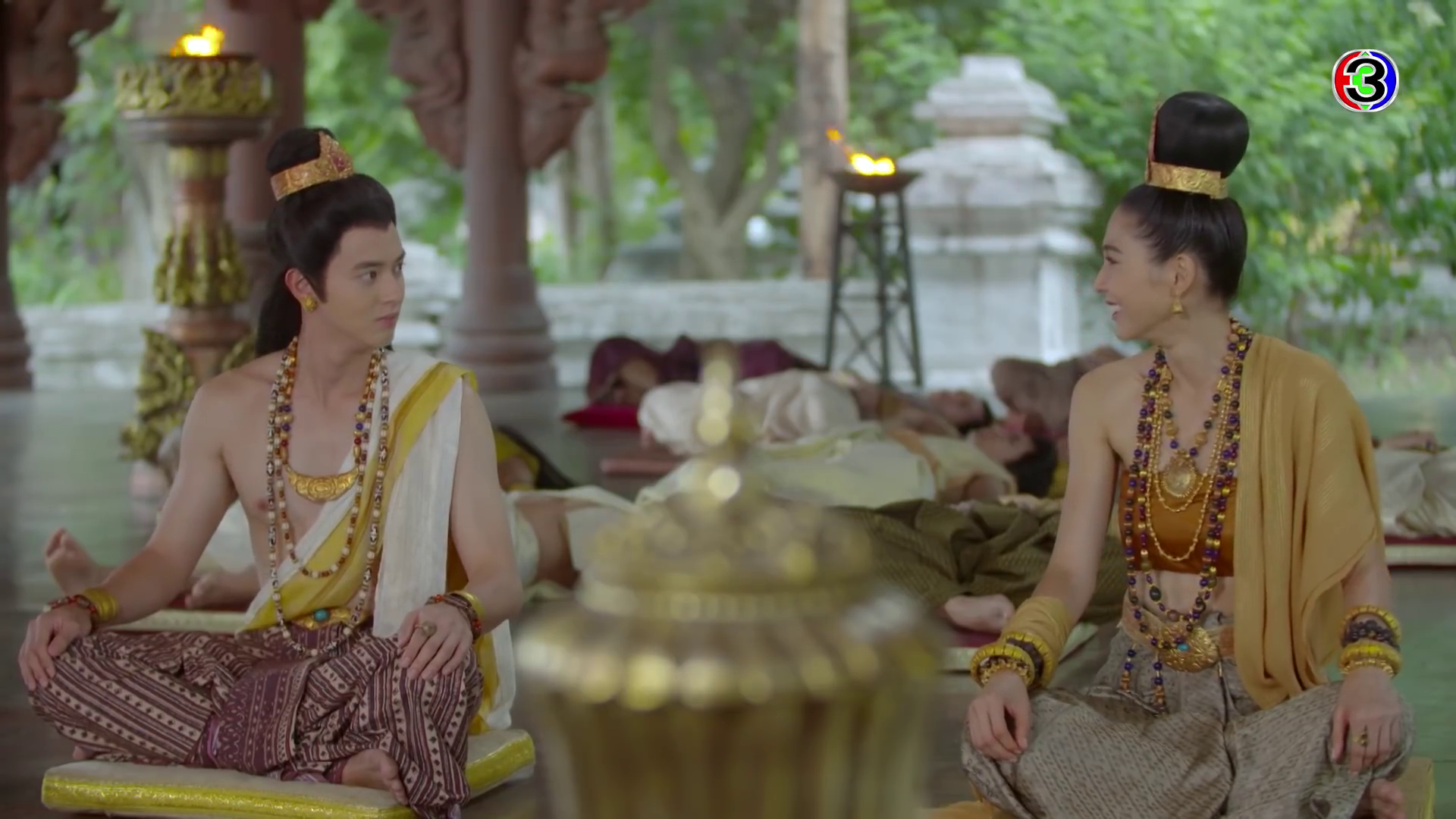
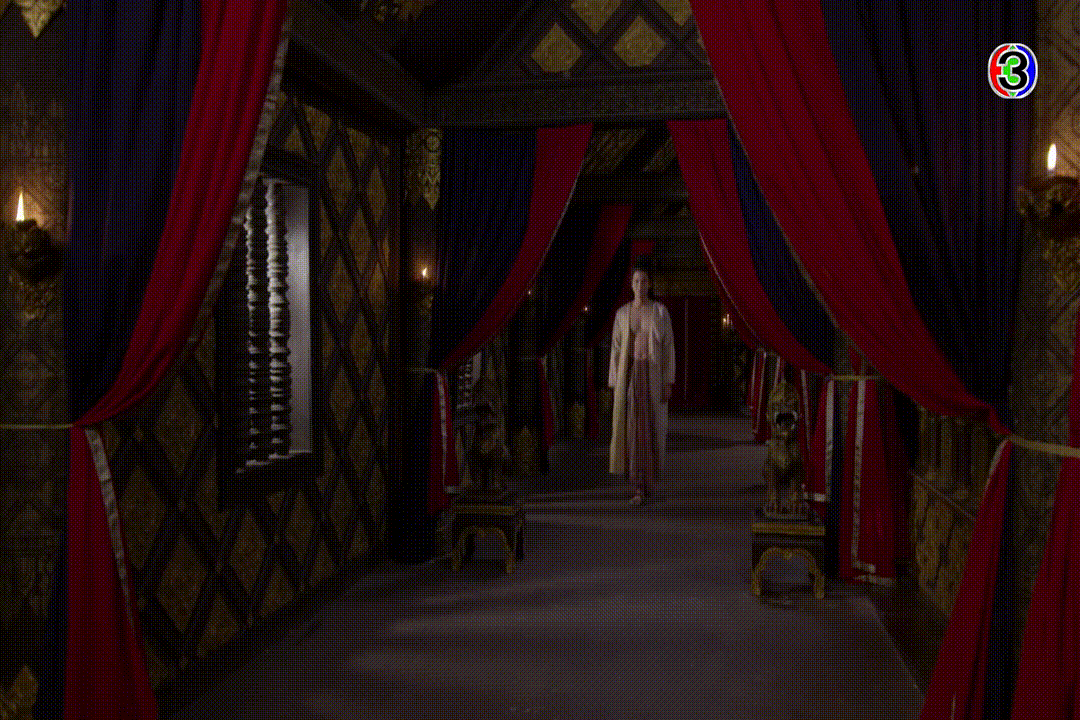
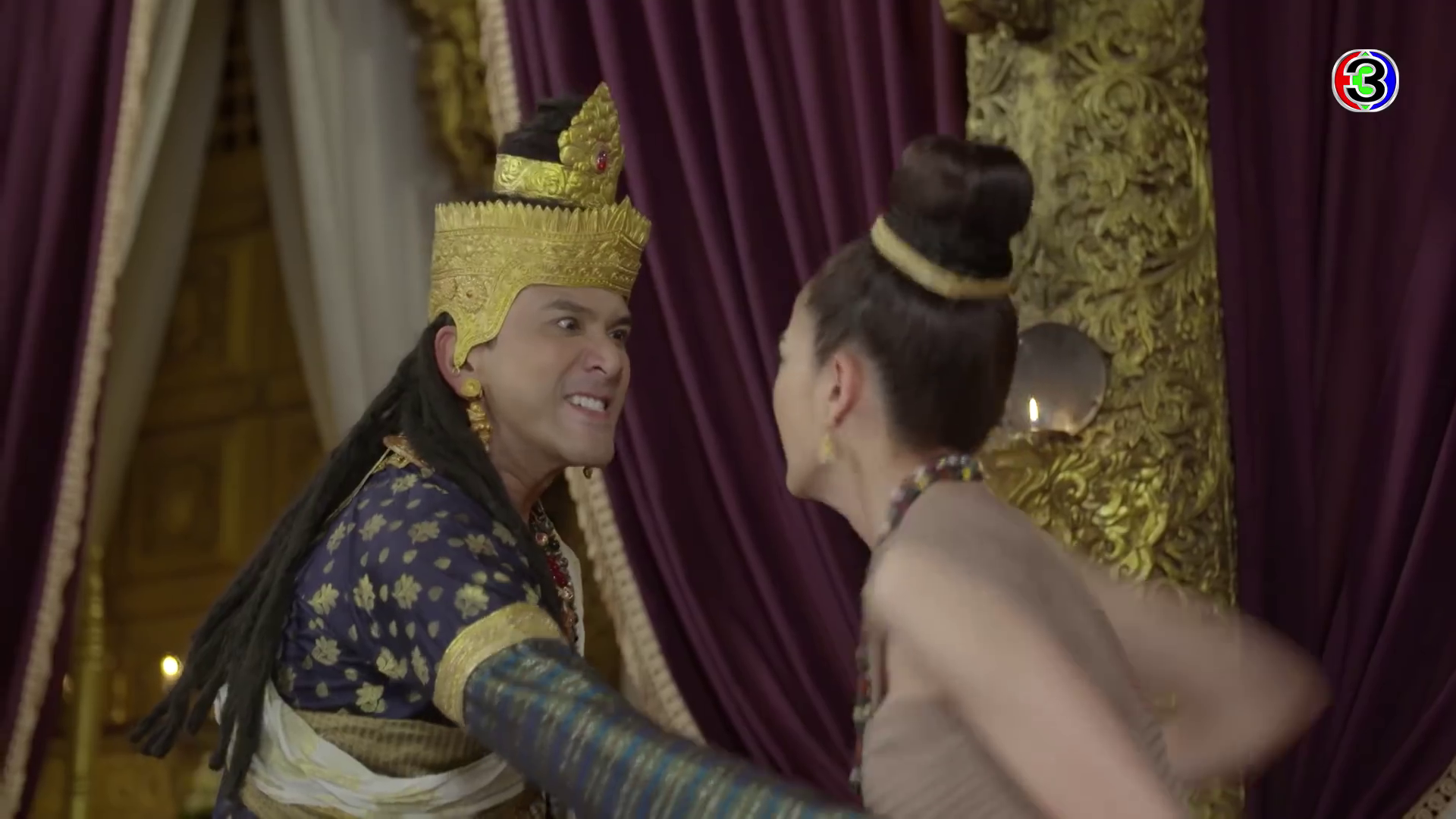
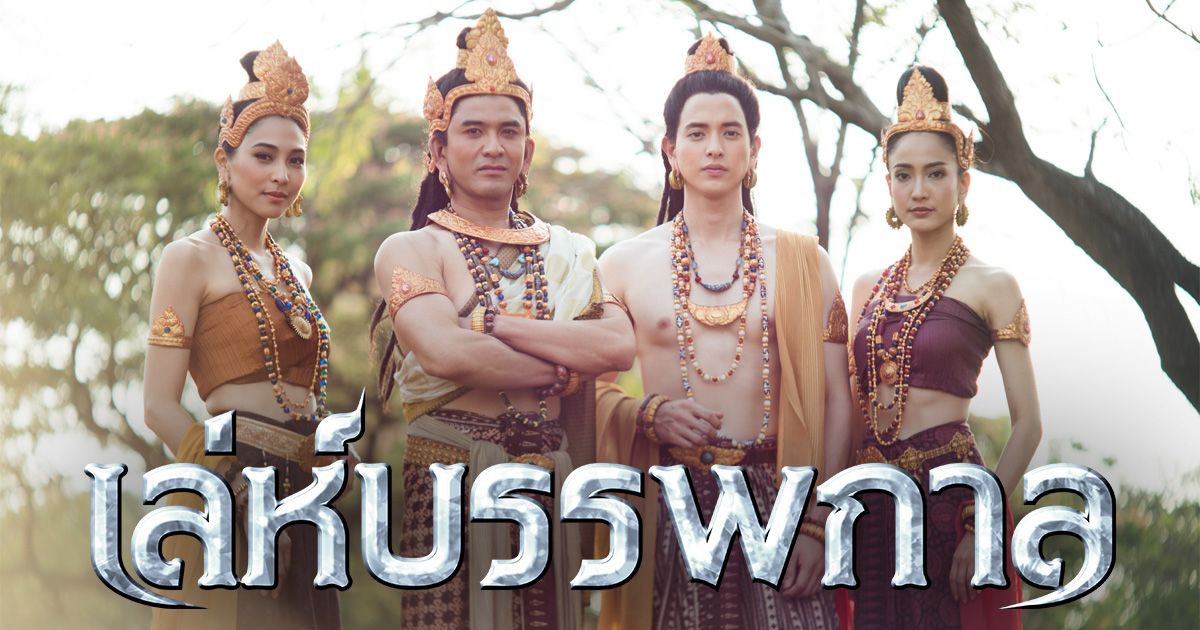


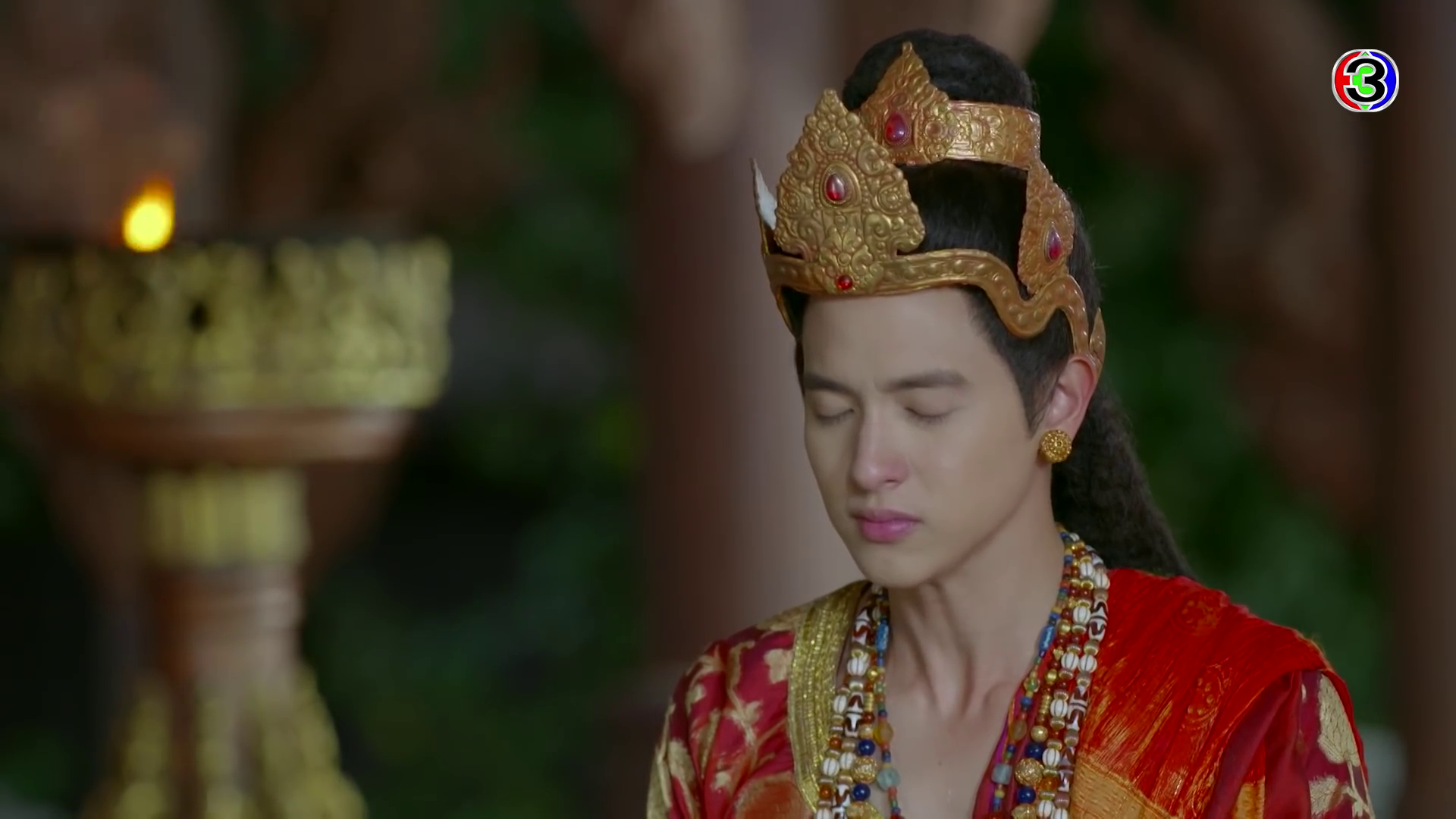
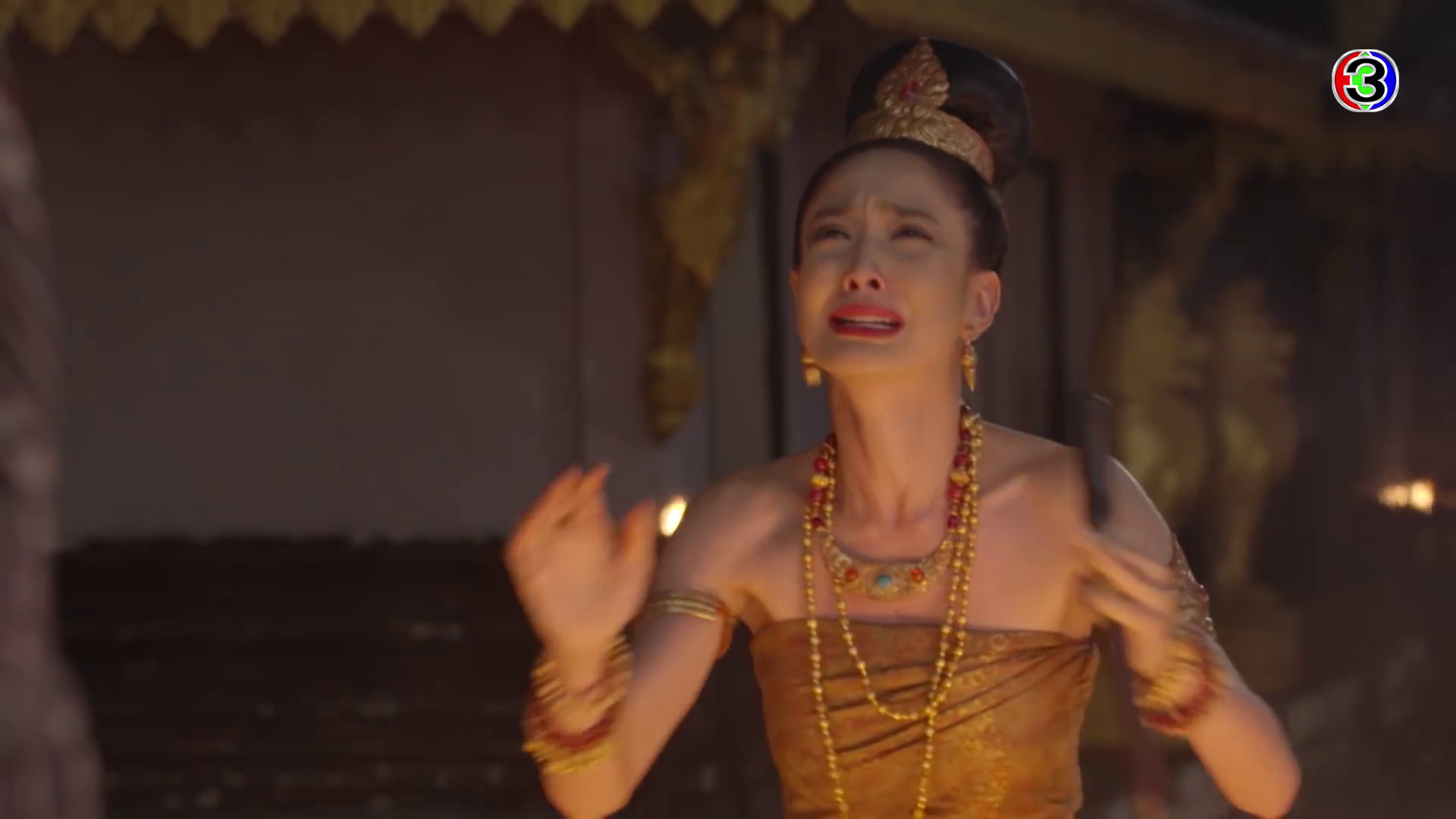
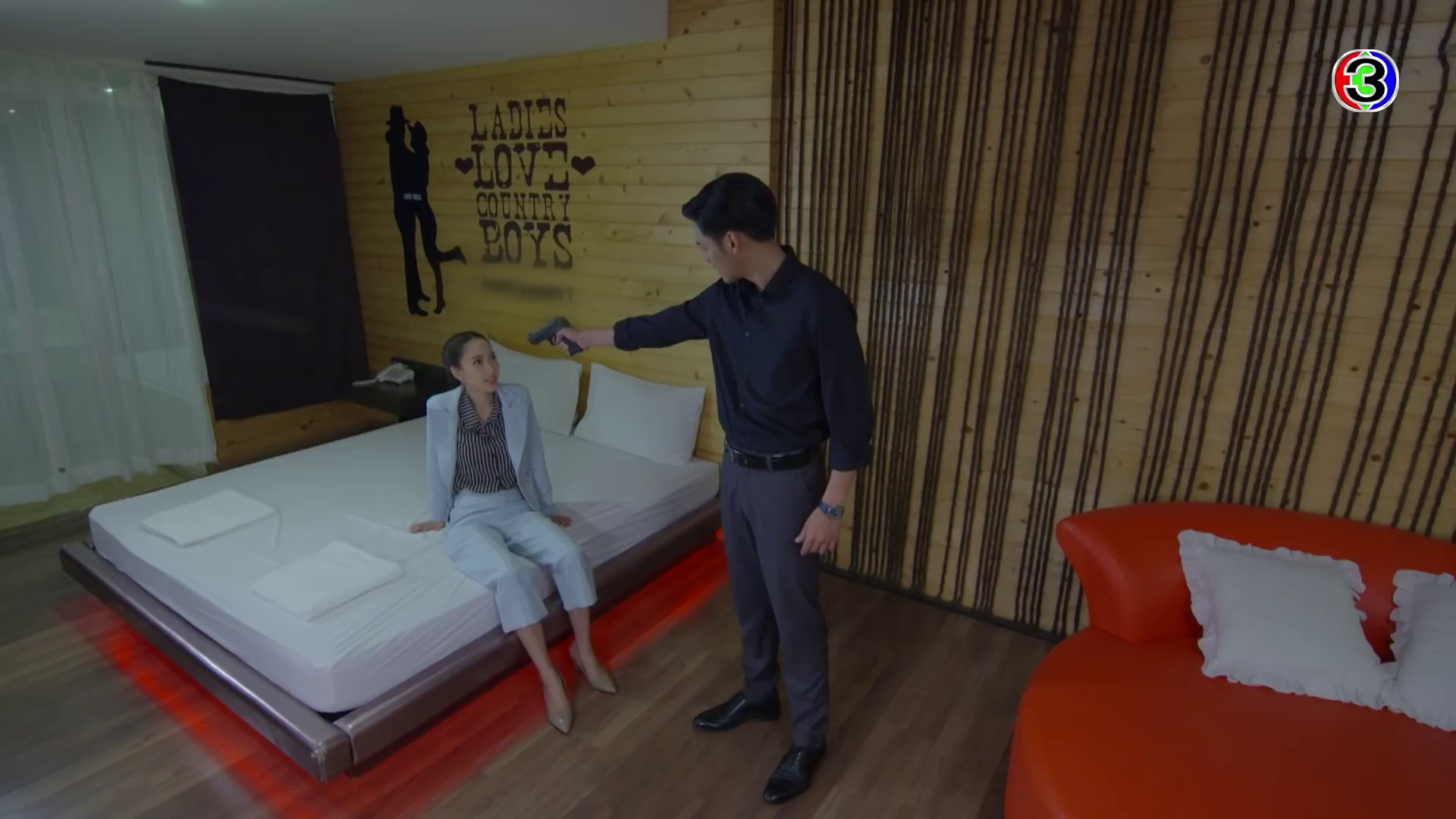
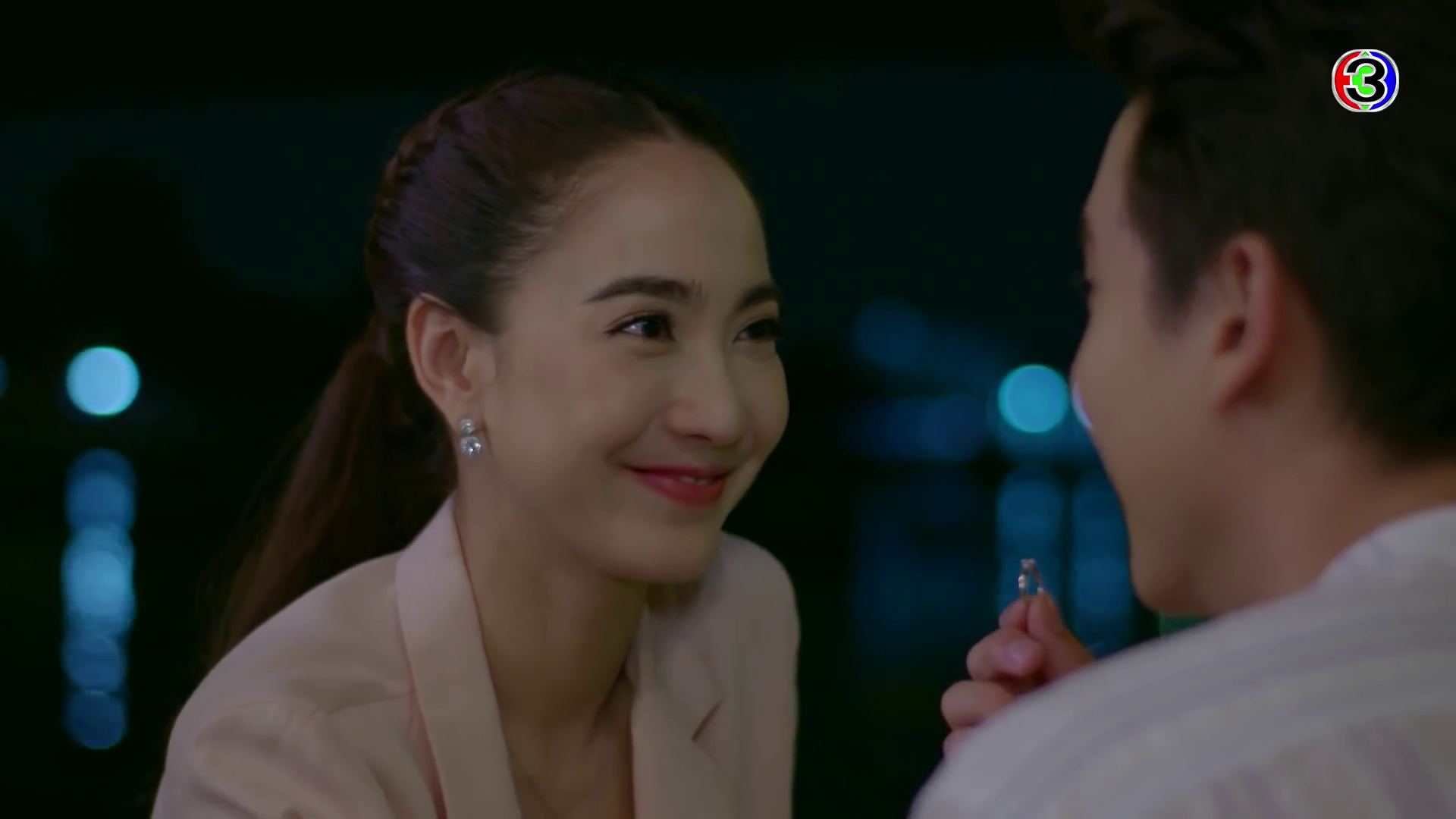

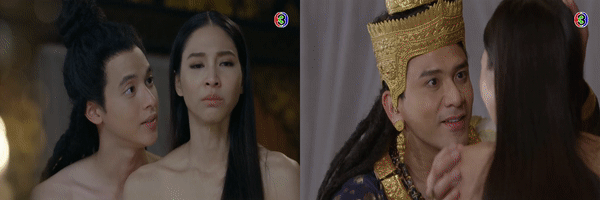

Nice and quite thoughtful review. I am a fan of James and Taew and that’s why I watched this pakora and enjoyed it thoroughly and admired their acting skills but I dare say that if some other actors/actresses played this pakora, I’m not sure I would have enjoyed it as much because of the lack of sentimentality as you pointed out. I agree that more episodes would be better to draw out the sentiment for each lifetime. I am guessing the team may have done more episodes as you suggested and probably would have shown the full version if the rating was better. The problem nowadays is that the viewers like the comedy more and the theme of this story is a bit dark and too serious, that’s why although the acting and sorry were good, the rating still suffered and that was why we did not get to see the full version. Thank you for taking the time to write such a pretty thesis. You passed with flying colors 🙂
LikeLike
Thank you for your comment! I don’t think there were really more episodes, because usually when Thai lakorns are shot, the number of episodes is already set and very rarely do they have to re-shoot additional scenes to extend it. So it really was just that. It was quite an accomplishment considering the original source, the novel, had 3 books. They squeezed everything in 14 episodes. Yes, it is a bit sad that this type of genre isn’t very popular, however, I hope that TV Scene won’t be discouraged to produce more quality lakorns like this. just hopefully they get to make it with the right formula next time.
LikeLike
I sure hope they did not cut short as you said. Although it is true that they don’t extend a popular drama by shooting more scenes but I have heard cases where they edit to cut short on dramas that are not receiving good rating (like “my love from another star”). Anyhow I would hate to think that there is even a better full version and we did not get to see it. It just seems like the last episode was rushed and not well thought out that I suspected the team edited last minute. Also there are some scenes in the flash back that was not shown, example the part where Sasina wrapped a wound on Rawi hand in the darawati time (Plerng flashed back) and the part where bunlua flashed back where she saw Sasina lying on Rawi’s lap. Also during the filming, there are some images on Instagram that I saw during the modern time that I don’t remember seeing either. Anyhow, I agree with your comments on the episode 1-6 that why do Khun Uthai ans Mae Duangkae deserve time be together? Let’s wait for more background in the dvaravati but even then, there was not much to show why they deserve to be together. Sure he saved her life and her father life and she danced beautifully but that was just not enough for them to be together, other than the destiny.
Anyhow, it was still an entertaining drama and I agree with you 100% of everyone doing a great job with acting, but the story sure could be much better! Anyhow I was sad the rating was not as high as it deserve for the acting and the effort but I was happy the the last episode got the highest rating in Bangkok that night. :-).
Thanks again for such a great review and allow me to discuss. I was born in Vietnam and live in the US currently None of my friends or family appreciate Thai drama enough to indulge me. My teenage son even makes fun of me for watching it but I love it regardless. Happy to have someone like you to discuss. 🙂
LikeLike
Thank you for the review. I am not much of a writer so I can’t really give a long feedback which I think you deserved. I agree that the drama is a masterpiece which one should’nt miss watching but at the end, there is not much of an emotional connection which would prompt the viewer to rewatch. It’s like there are only certain scenes which are memorable and heart tugging but because these are happening in 3 lifetimes, there is not much of a connection. I mean, I feel more stuck in Rawi’s time & sad but I am not allowed to linger there, grieve & appreciate the actors because I need to move forward to catch up with the new happenings & so I forget about what I felt earlier to focus on the present scenes… this is probably the reason tearjerkers are popular…I would say there is a lack of emotional investment. SAYANG.. As for James, he shone in this drama…showing his acting chops…much much more than in Krom Karm. I hope he wins another award.
LikeLike
Thank you for the comment! Yes, I think it’s really a pity they it had all the elements but fell short in the end. I wonder if they had stretched out the story more and made the editing tighter, if they can put more sentimentality to the story. James is really stellar in the show and more than anything, i felt swayed by his acting.
LikeLike